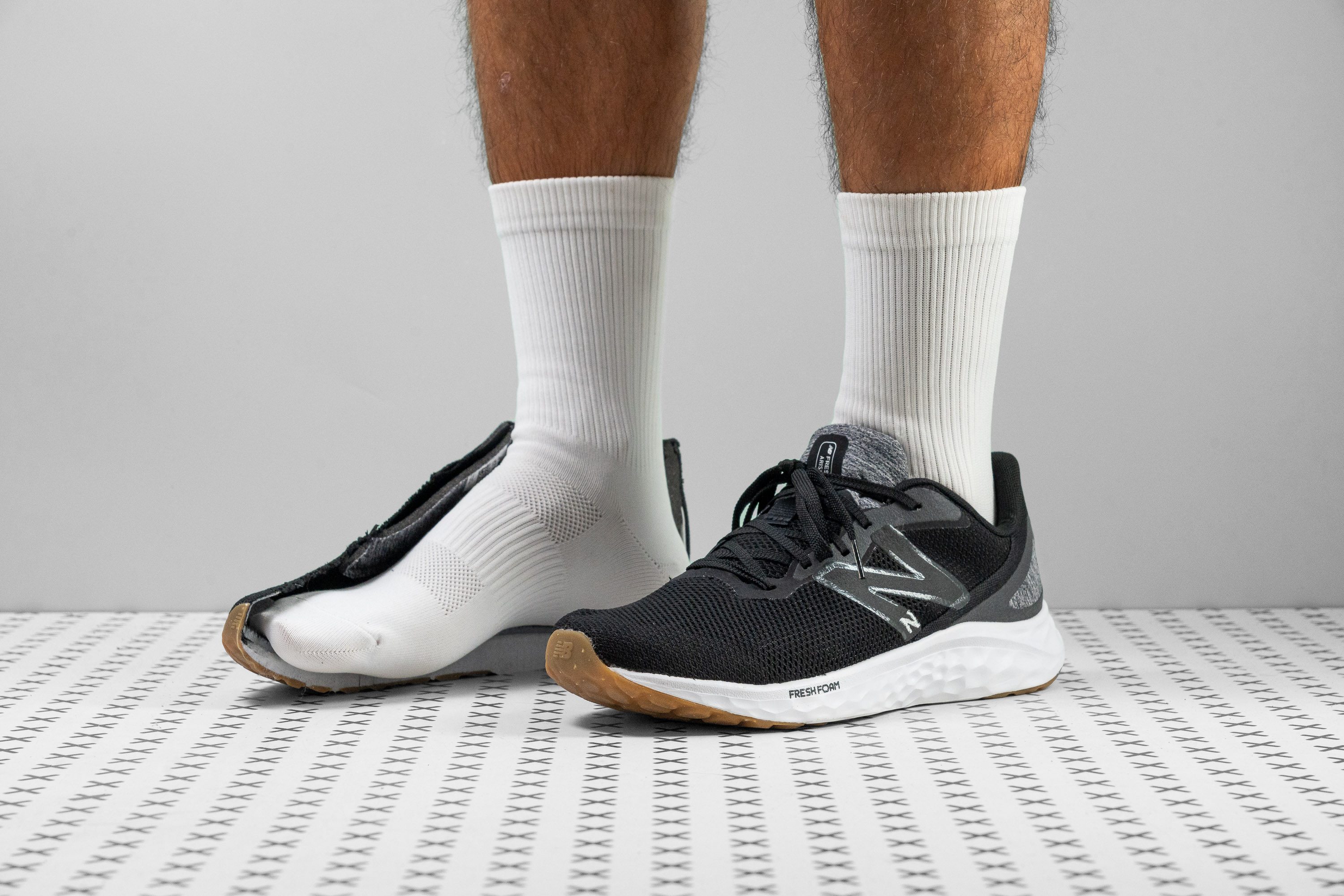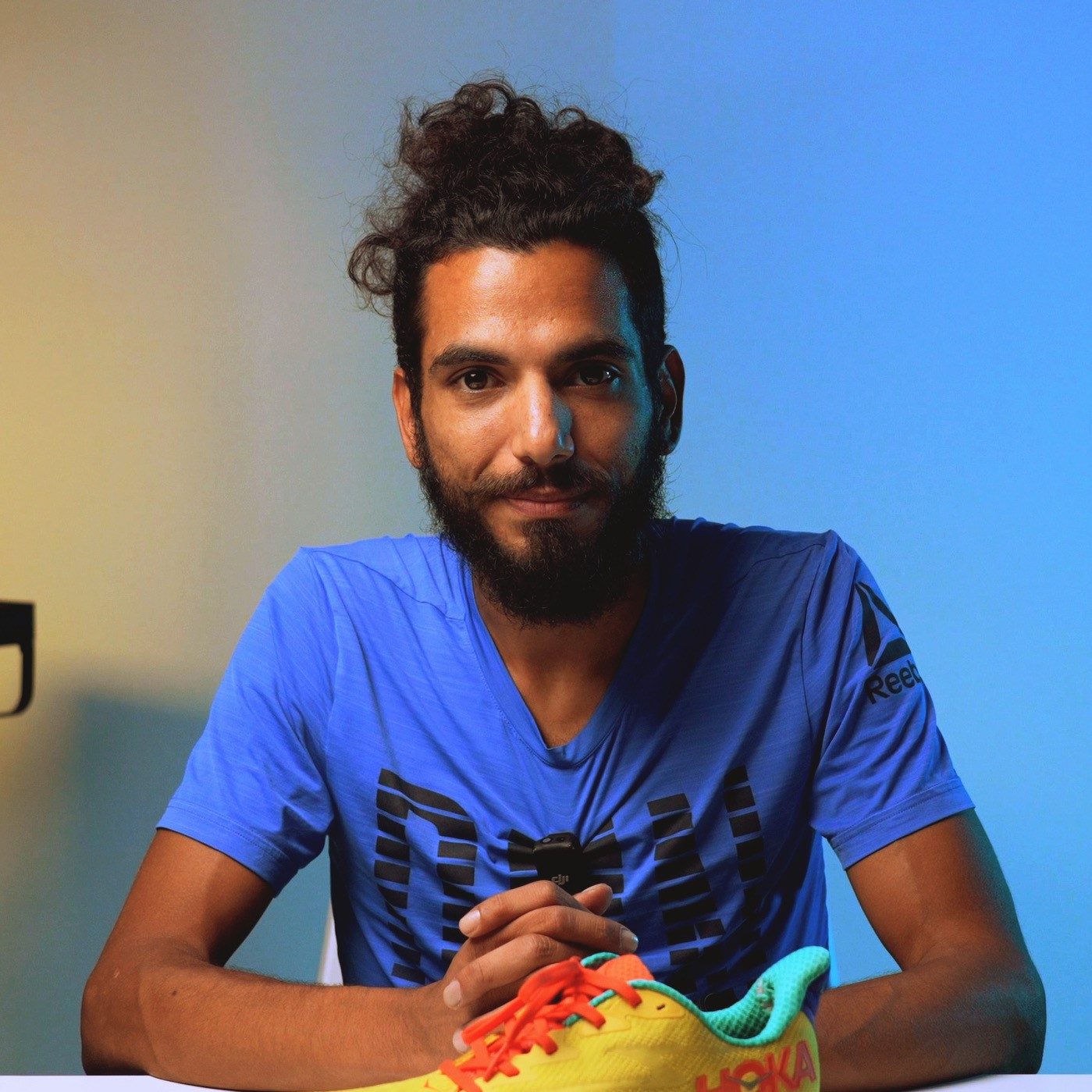Our verdict
Pros
- Cloud-like cushioning
- Has a nice bounce
- Extremely flexible
- Lightweight
- Great for easy/recovery runs
- Comfy enough for all-day wear
- Minimal break-in needed
Cons
- Lacks arch support
- Heel rubs
- Stiff upper
- Not for wide feet
Audience verdict
Comparison
The most similar running shoes compared
+ + Add a shoe | |||||
|---|---|---|---|---|---|
| Audience score | 70 Bad! | 89 Great! | 89 Great! | 75 Bad! | |
| Price | $70 | $85 | $140 | $75 | |
| Pace | Daily running | Daily running | Daily runningTempo | Daily running | |
| Shock absorption | Low | Low | Low | Low | |
| Energy return | Moderate | Low | Low | Low | |
| Traction | Moderate | Low | Moderate | Moderate | |
| Arch support | Neutral | Neutral | Neutral | Neutral | |
| Weight lab Weight brand | 8.5 oz / 242g 8.7 oz / 246g | 8.5 oz / 241g 9.2 oz / 260g | 8.5 oz / 240g 8.1 oz / 229g | 8.5 oz / 241g 8.5 oz / 240g | |
| Lightweight | ✓ | ✓ | ✓ | ✓ | |
| Drop lab Drop brand | 7.7 mm 8.0 mm | 9.3 mm 10.0 mm | 10.1 mm 6.0 mm | 6.0 mm 6.0 mm | |
| Strike pattern | Mid/forefoot | HeelMid/forefoot | Heel | Mid/forefoot | |
| Size | True to size | True to size | True to size | True to size | |
| Midsole softness | Soft | Balanced | Firm | Firm | |
| Difference in midsole softness in cold | Big | Normal | Small | Small | |
| Toebox durability | Bad | Good | Decent | Decent | |
| Heel padding durability | Bad | Good | Bad | Good | |
| Outsole durability | Good | Decent | Good | Bad | |
| Breathability | Moderate | Breathable | Moderate | Moderate | |
| Width / fit | Medium | Medium | Medium | Medium | |
| Toebox width | Medium | Medium | Wide | Medium | |
| Stiffness | Flexible | Moderate | Moderate | Flexible | |
| Torsional rigidity | Flexible | Moderate | Flexible | Flexible | |
| Heel counter stiffness | Flexible | Moderate | Flexible | Flexible | |
| Heel lab Heel brand | 28.1 mm | 29.7 mm 30.0 mm | 27.9 mm 28.0 mm | 25.9 mm | |
| Forefoot lab Forefoot brand | 20.4 mm | 20.4 mm 20.0 mm | 17.8 mm 22.0 mm | 19.9 mm | |
| Widths available | NormalWideX-Wide | Normal | Normal | NormalWideX-Wide | |
| Orthotic friendly | ✓ | ✓ | ✓ | ✓ | |
| Season | All seasons | SummerAll seasons | All seasons | All seasons | |
| Removable insole | ✓ | ✓ | ✓ | ✓ | |
| Ranking | #379 Bottom 1% | #112 Top 30% | #84 Top 22% | #360 Bottom 5% | |
| Popularity | #18 Top 5% | #127 Top 34% | #103 Top 27% | #62 Top 17% |
Who should buy
We recommend the New Balance FF Arishi v4 as a great choice for:
- Casual runners looking for a lightweight, neutral daily trainer for easy runs/jogs
- Fitness enthusiasts and runners who prefer plush, cloud-like cushioning for comfort over performance
- Those in the market for a versatile shoe that’s comfy enough for walks and all-day wear
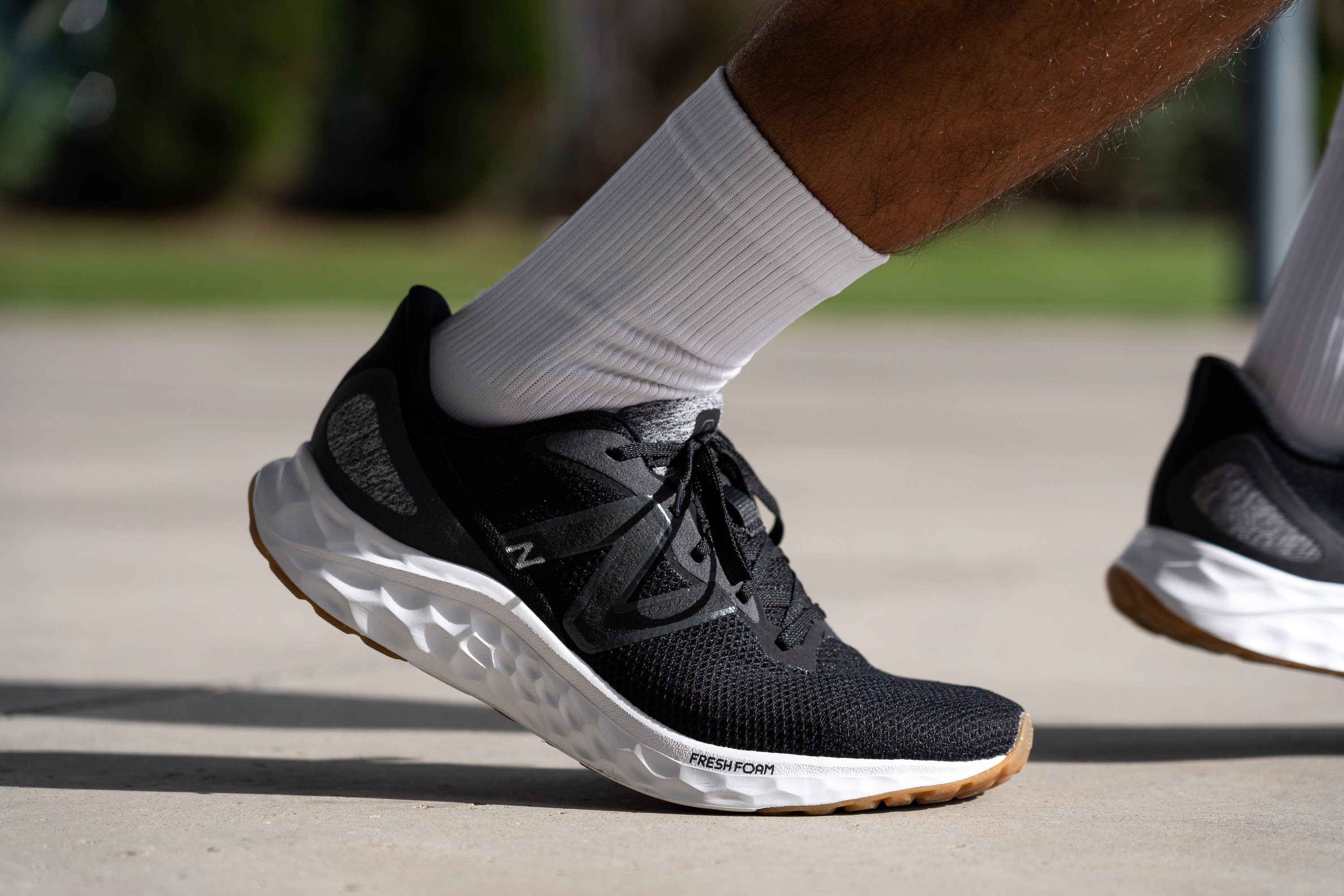
Who should NOT buy
While the Arishi v4’s midsole delivers premium levels of comfort, it lacks the snappy responsiveness to facilitate speedier or longer runs. The similar-looking but less wallet-friendly New Balance FF X More v4 is a great alternative that can go the distance, while the New Balance FuelCell Rebel v3 is a true speed demon.
Pronating runners won’t find the arch support they need in the Arishi v4. We suggest looking into the ASICS GT 1000 12; a similarly priced stability shoe, or the New Balance Fresh Foam X Kaiha Road as a neutral option that’s exceptionally stable.
As opposed to the rest of the shoe, we found the Arishi v4’s upper to be rather stiff and unforgiving, especially during our initial test runs. The New Balance FF Roav v2 boasts higher-quality materials in its upper construction that feel much less stiff despite being similarly priced.
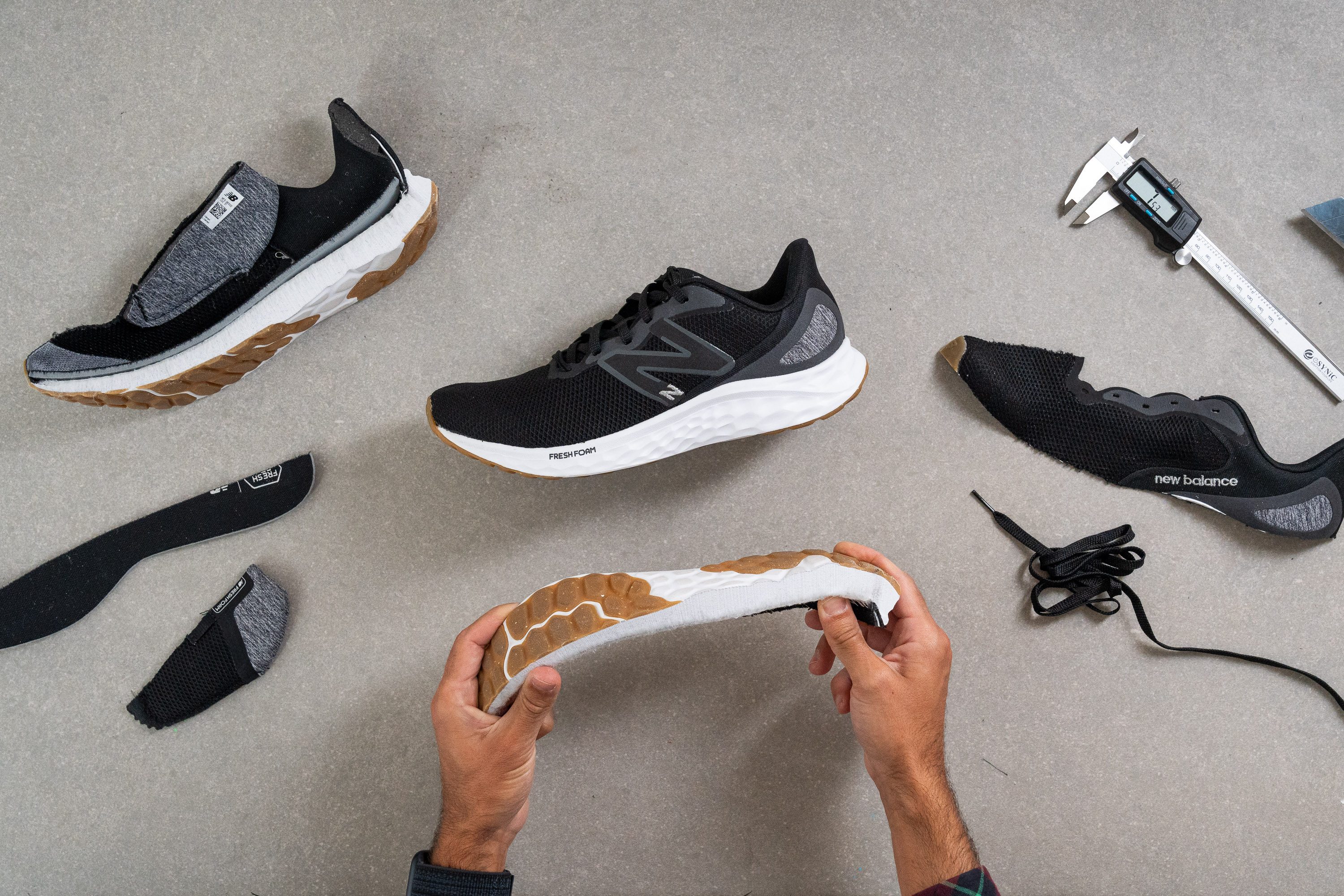
Cushioning
Shock absorption
We truly hope you’re a fan of ground feel, especially if you land on your forefoot. With only 109 SA in the heel and an ultra-minimal 67 SA up front, this shoe caters to runners who steer clear of heavily-cushioned, max-stack designs.
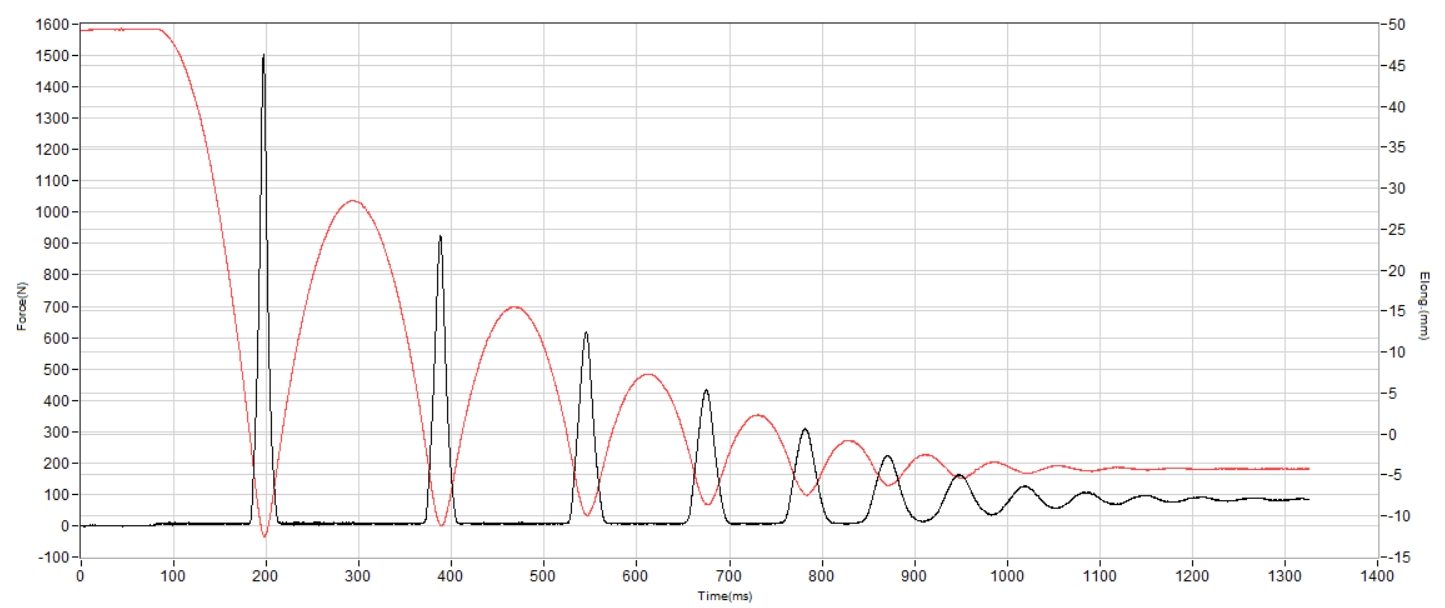
| Fresh Foam Arishi v4 | 109 SA |
| Average | 130 SA |
Energy return
On the flip side, we were surprised to find higher energy return than expected. Sure, the Arishi v4 comes at a budget-friendly price, but its Fresh Foam midsole impressed us with 61.1% in the heel and 63.8% in the forefoot.
That’s standout value, and easily one of the best energy return-to-cost ratios we’ve tested.
| Fresh Foam Arishi v4 | 61.1% |
| Average | 58.6% |
Heel stack
The Arishi v4 is a rather low-profile shoe, with its heel stack coming in at a below-average 28.1 mm according to our caliper measurements.
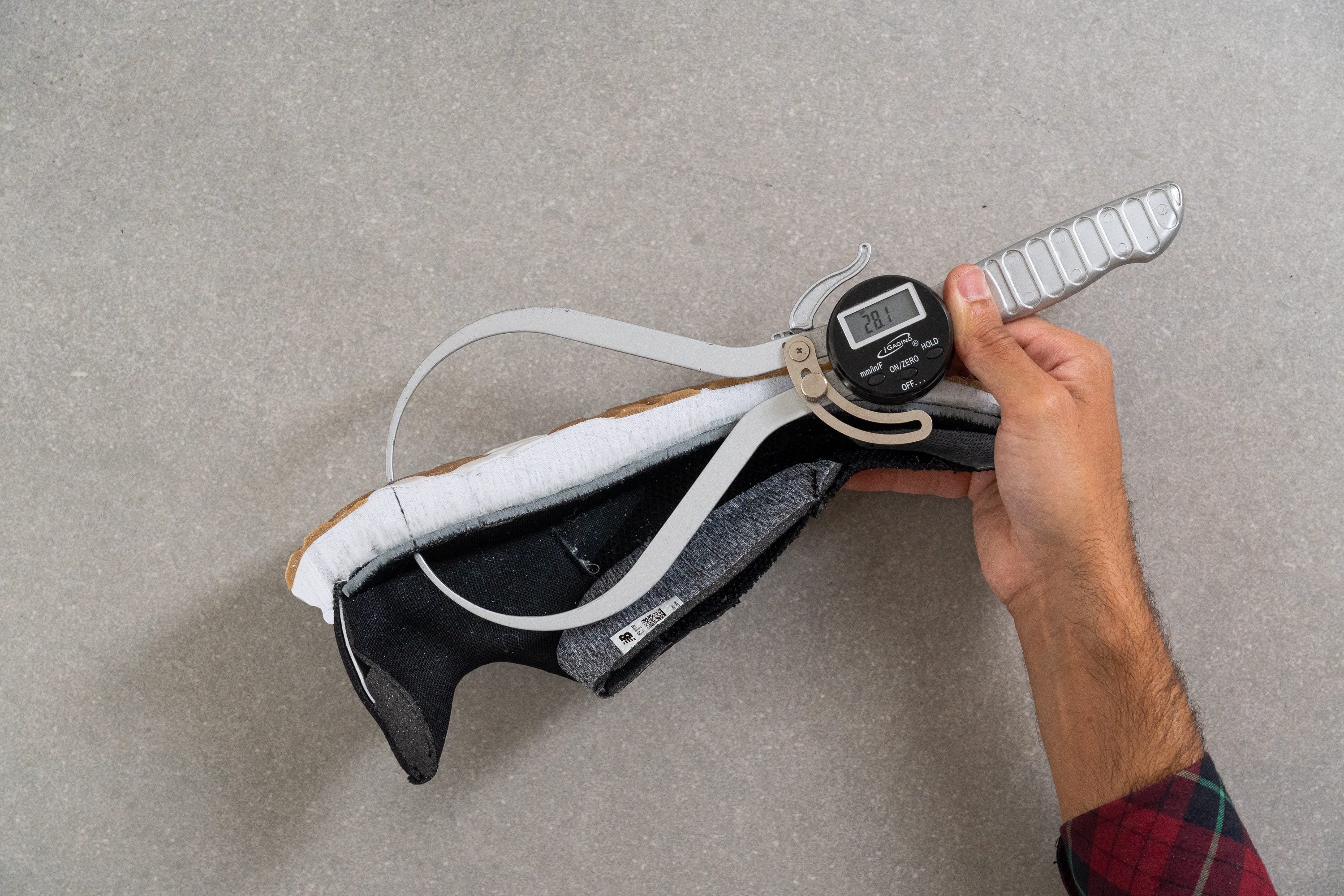
Nevertheless, this is still more than enough foam underfoot to provide heel strikers with well-cushioned and protective landings.
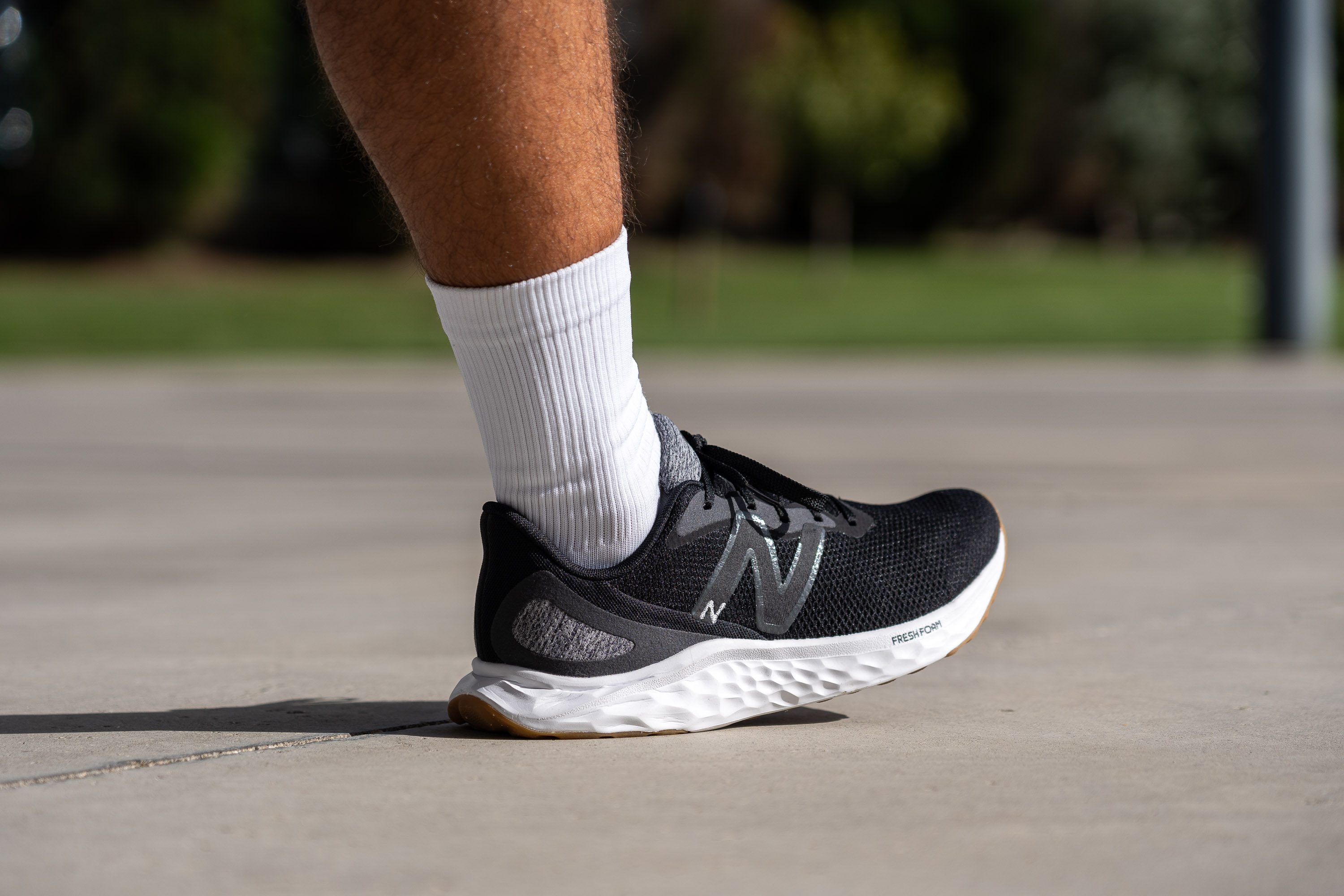
| Fresh Foam Arishi v4 | 28.1 mm |
| Average | 34.8 mm |
Forefoot stack
Measuring 20.4 mm thick, the shoe’s forefoot stack is also shorter than average. Again, however, this still provides forefoot strikers enough cushioning for solid impact dampening while also providing a certain level of ground feel underfoot.
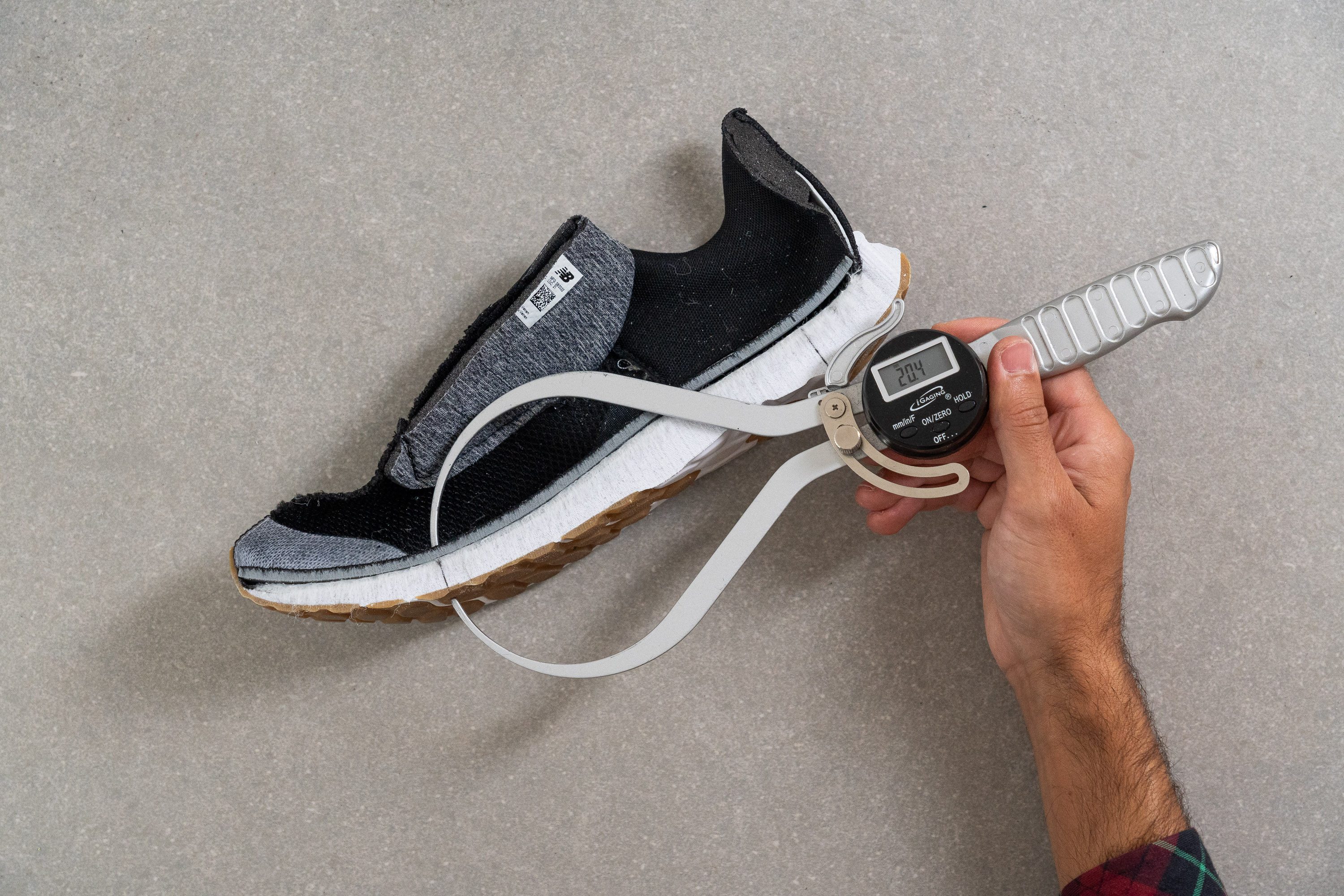
As such the shoe feels more natural than its more maximalist counterparts while still pampering our feet.
| Fresh Foam Arishi v4 | 20.4 mm |
| Average | 26.2 mm |
Drop
The difference in our stack measurements leaves us with a drop height of 7.7 mm, making the 8 mm stated by New Balance commendably accurate. This level of accuracy isn’t always a given as this article explores.
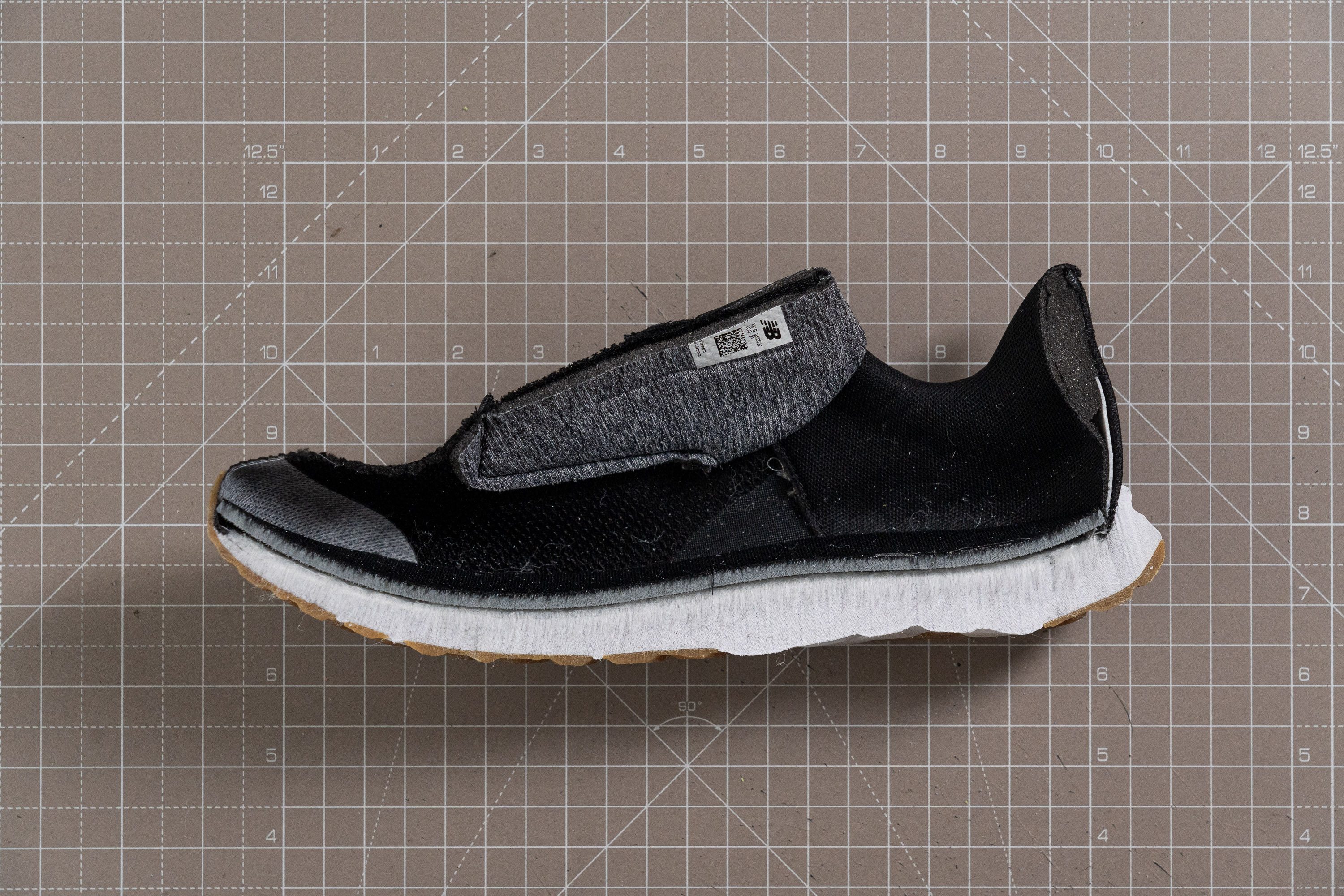
This drop height classifies the Arishi v4 as a mid-drop shoe which is beneficial for a wide variety of runners whether midfoot/forefoot or heel strikers.
| Fresh Foam Arishi v4 | 7.7 mm |
| Average | 8.6 mm |
Midsole softness
We pressed our durometer against the shoe’s Fresh Foam midsole and got a deliciously plush reading of 14.5 HA which is much softer than our current lab average. This not only lends our landings a delightful pillowy sensation, but the energetic rebound of the midsole gives us a jolly spring in our step that feels fun and responsive during our test runs.
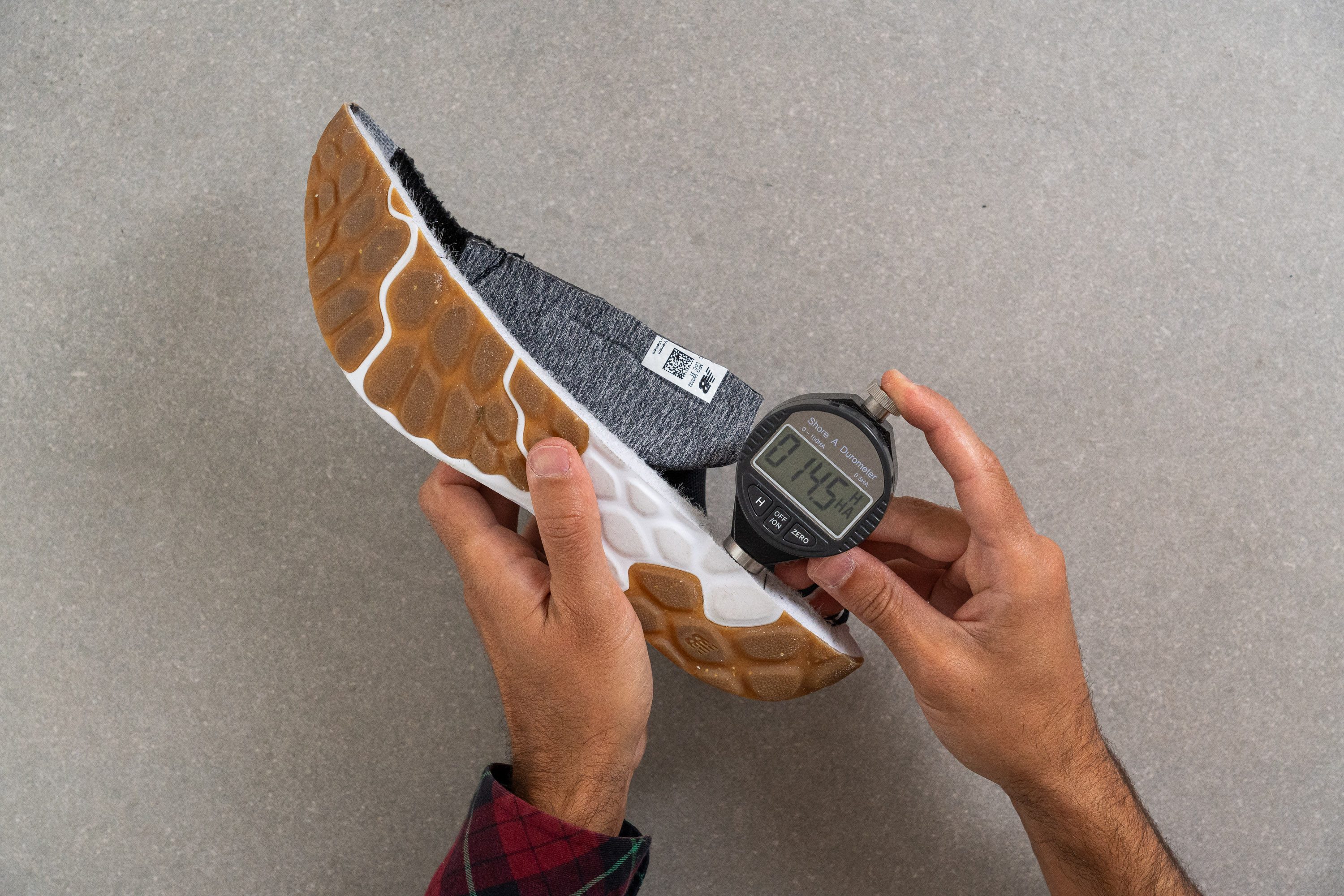
While certainly responsive, the midsole lacks the energy return to efficiently facilitate speedy sessions. For a daily trainer that’s better suited to pushing the pace, we recommend checking out the similarly plush Hoka Mach X.
| Fresh Foam Arishi v4 | 14.5 HA |
| Average | 20.4 HA |
Size and fit
Size
New Balance Fresh Foam Arishi v4 fits true to size (238 votes).
Internal length
| Fresh Foam Arishi v4 | 265.6 mm |
| Average | 269.4 mm |
Width / Fit
Using our caliper, we measured the shoe to be 93.6 mm wide. This is narrower than the average road shoe, which means that runners with broad feet will likely experience hotspots in this shoe.
For those runners, we recommend looking into the other widths available or checking out a more accommodating shoe like the New Balance FF X Kaiha Road or the Brooks Launch 10 instead.
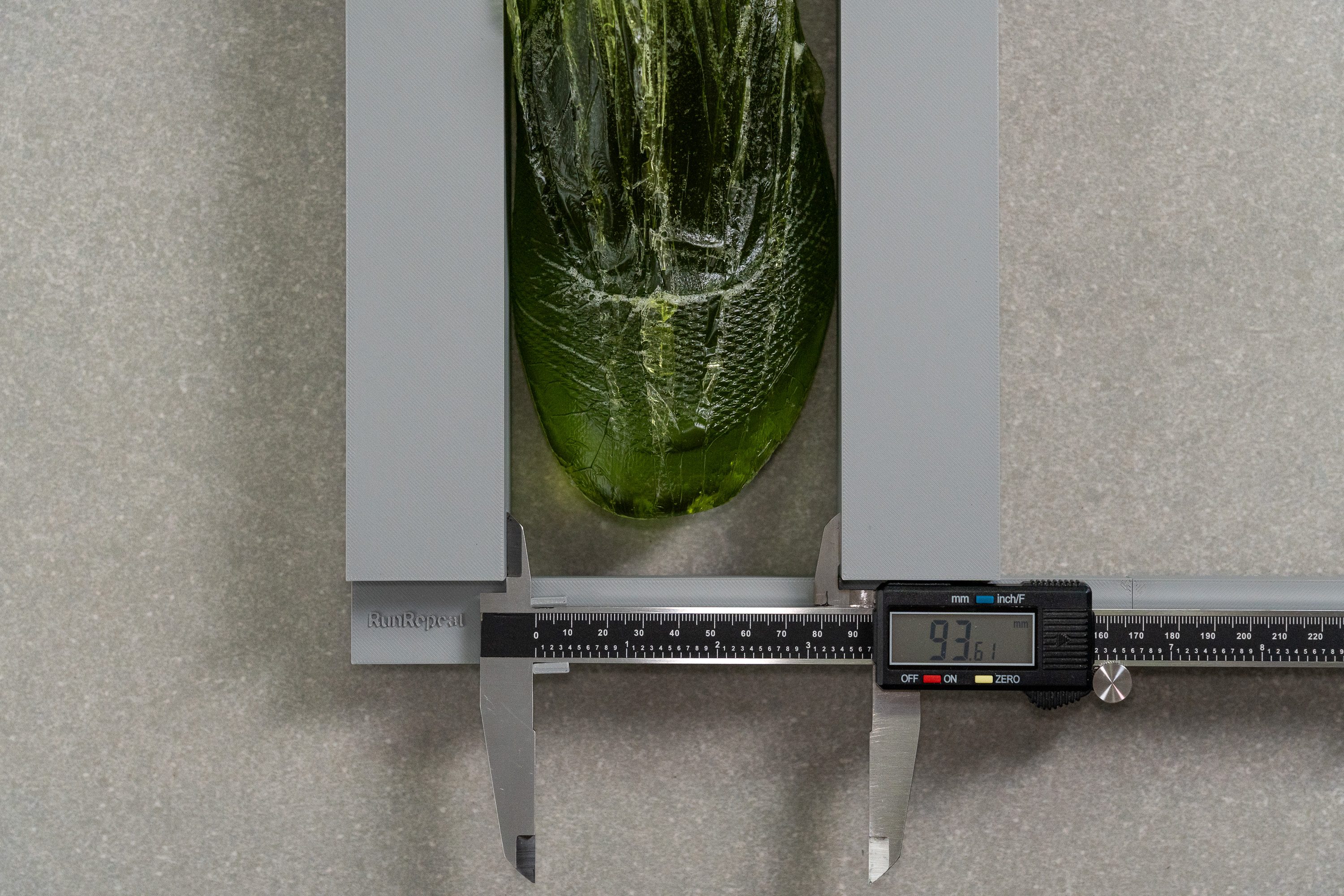
| Fresh Foam Arishi v4 | 93.6 mm |
| Average | 95.1 mm |
Toebox width
Moving up to the area around the big toe, we measured the Arishi v4’s toebox to be 72.6 mm wide. This is slightly narrower than our current lab average and means that runners with narrow-to-normal-width feet will have enough of room to splay out naturally within the shoe.
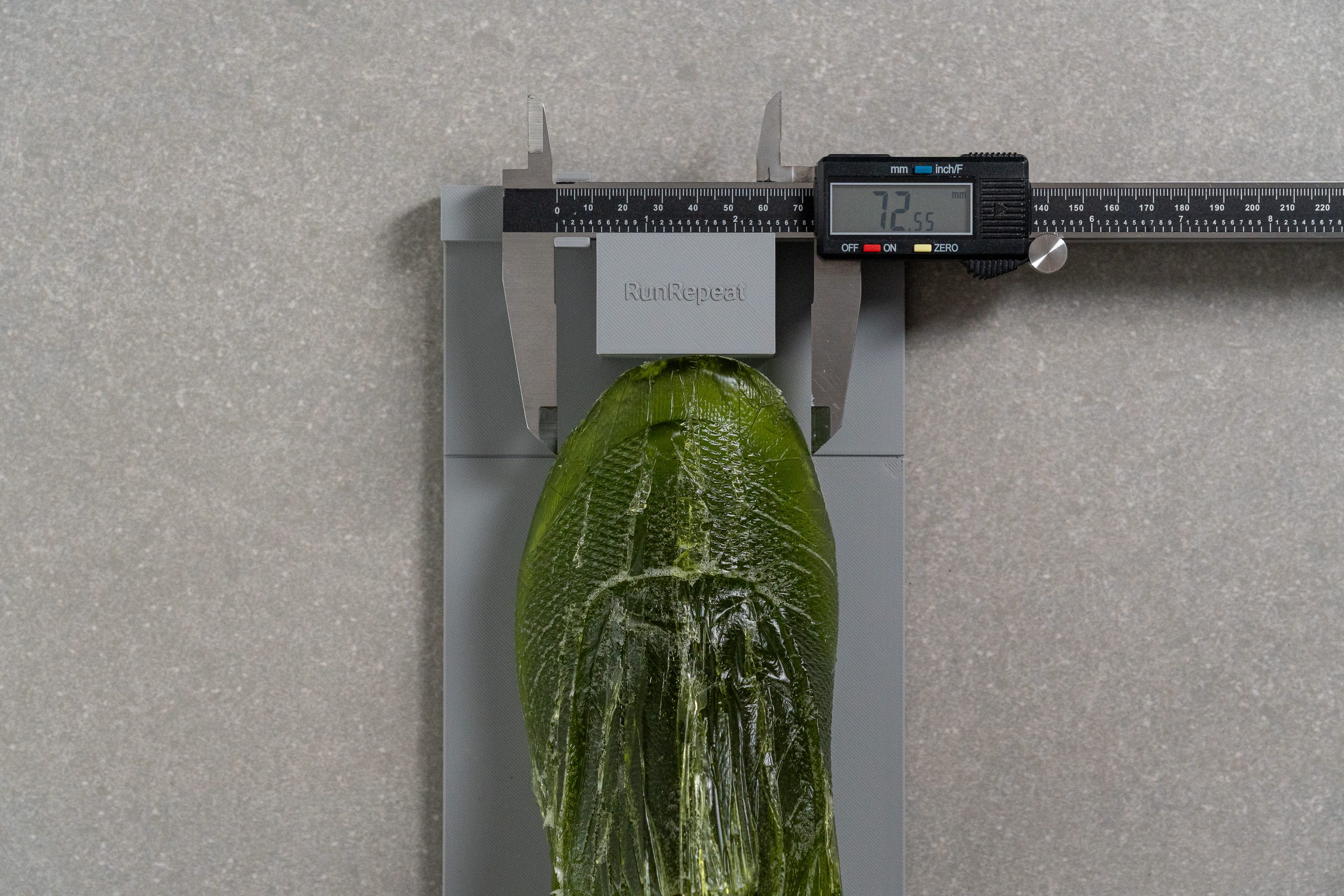
| Fresh Foam Arishi v4 | 72.6 mm |
| Average | 73.3 mm |
Toebox height
In terms of vertical space, the Arishi v4 delivers with 27.8 mm of height and ensures a pressure-free experience for those who frequently encounter discomfort on their toes.
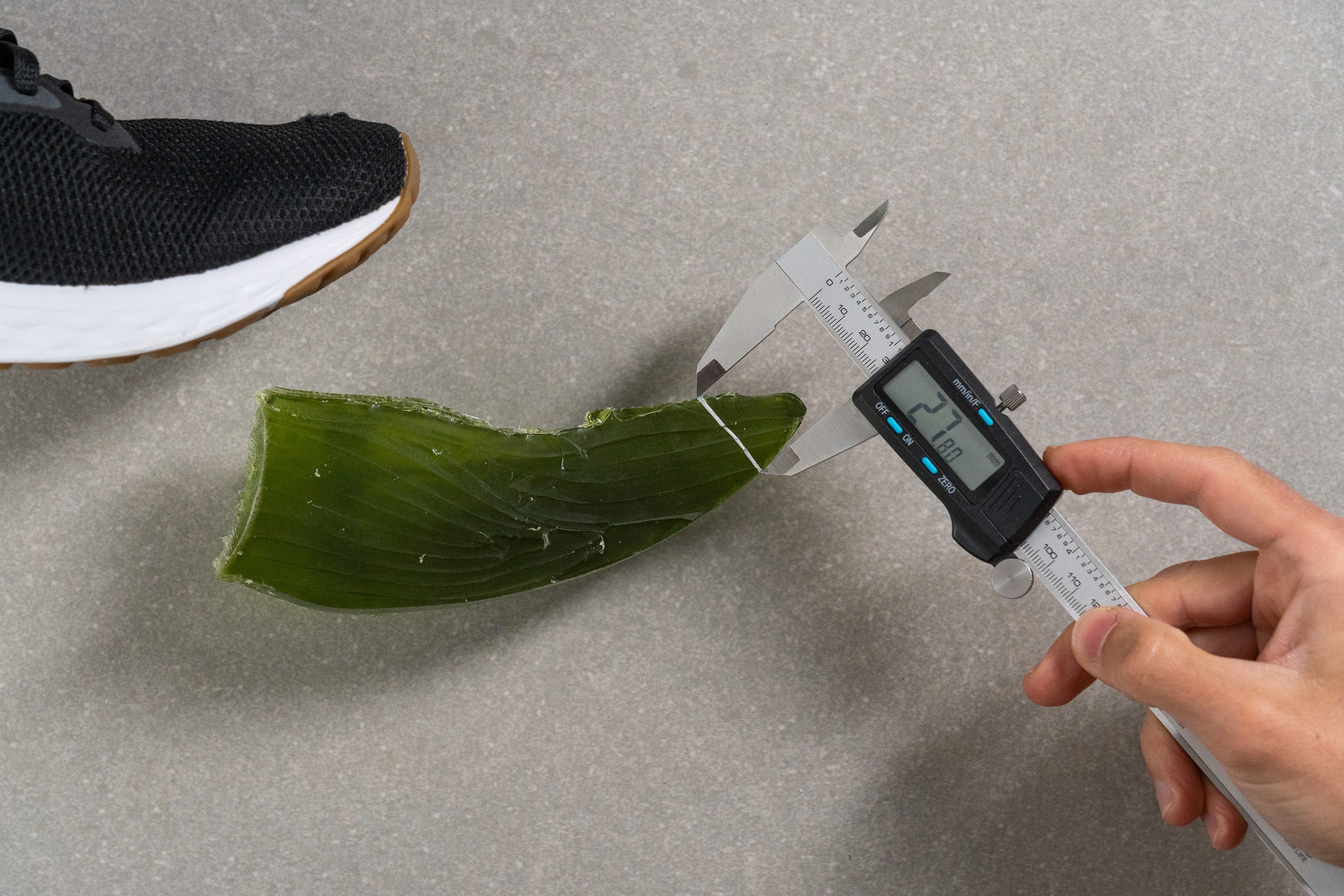
| Fresh Foam Arishi v4 | 27.8 mm |
| Average | 27.0 mm |
Traction / Grip
Traction test
The Arishi v4 returned a slightly below-average friction score of 0.41 in our SATRA TM144 grip test. But there is absolutely nothing to worry about because that coefficient still indicates solid grip on both dry and wet surfaces.
| Fresh Foam Arishi v4 | 0.41 |
| Average | 0.49 |
Outsole design
The outsole of the Arishi v4 instantly reminded us of an indoor court shoe—New Balance opted for gum rubber instead of the usual black or blown rubber. We found that the coverage is solid in high-impact areas, with pods shaped to mimic the foam’s texture, blending grip and style!
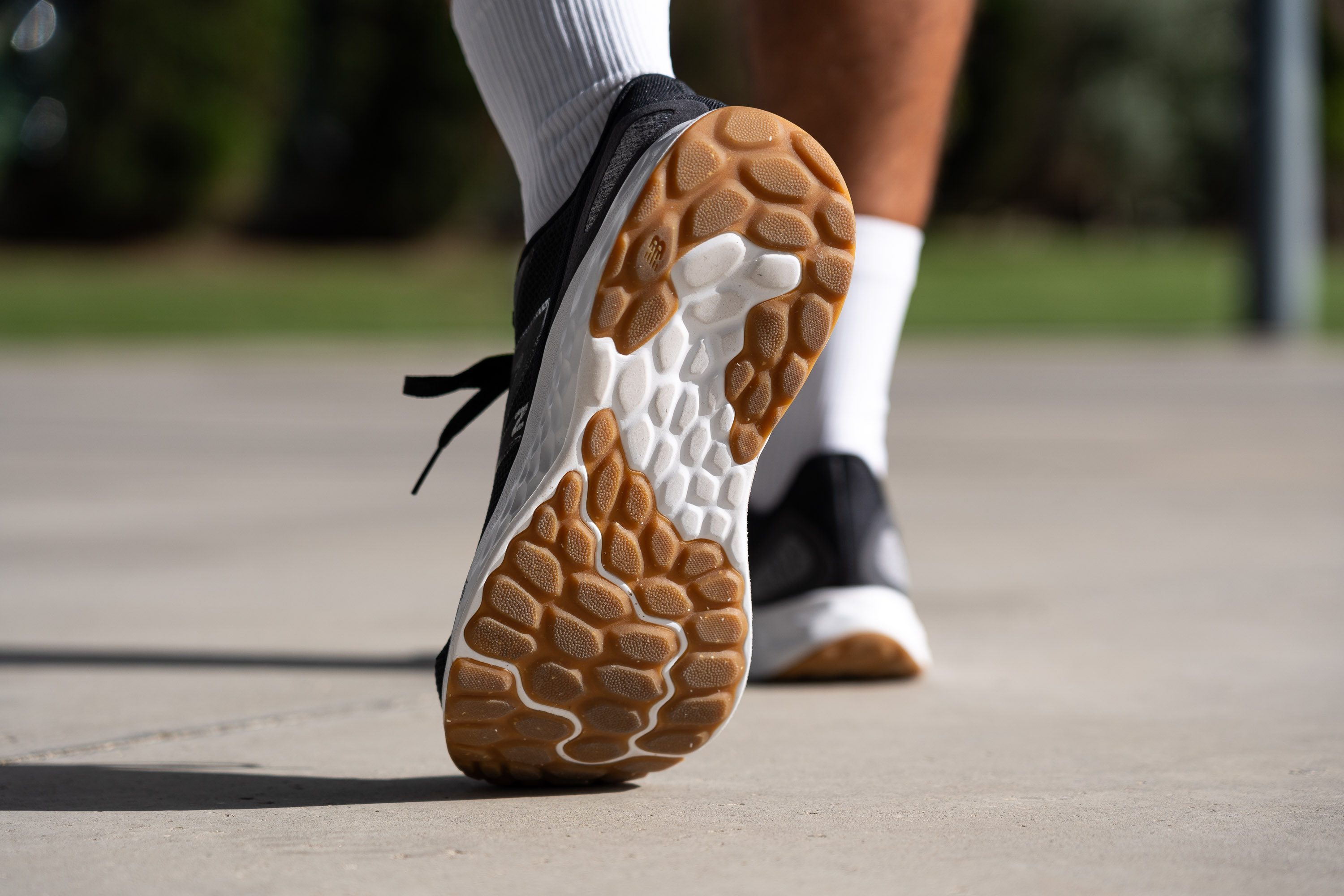
Flexibility / Stiffness
We secured the Arishi v4 to our custom machine and measured the amount of force needed to flex it 30 degrees. With a mere 7.0N required to bend the shoe to the desired point, the Arishi v4 is among the most flexible shoes we’ve tested in the lab so far!
This is great for a daily trainer as it means that the shoe is able to bend with our foot very easily, which translates to a ride that feels comfy and forgiving. This extreme flexibility also means that the shoe doesn’t need to be broken in and will feel great right out of the box.
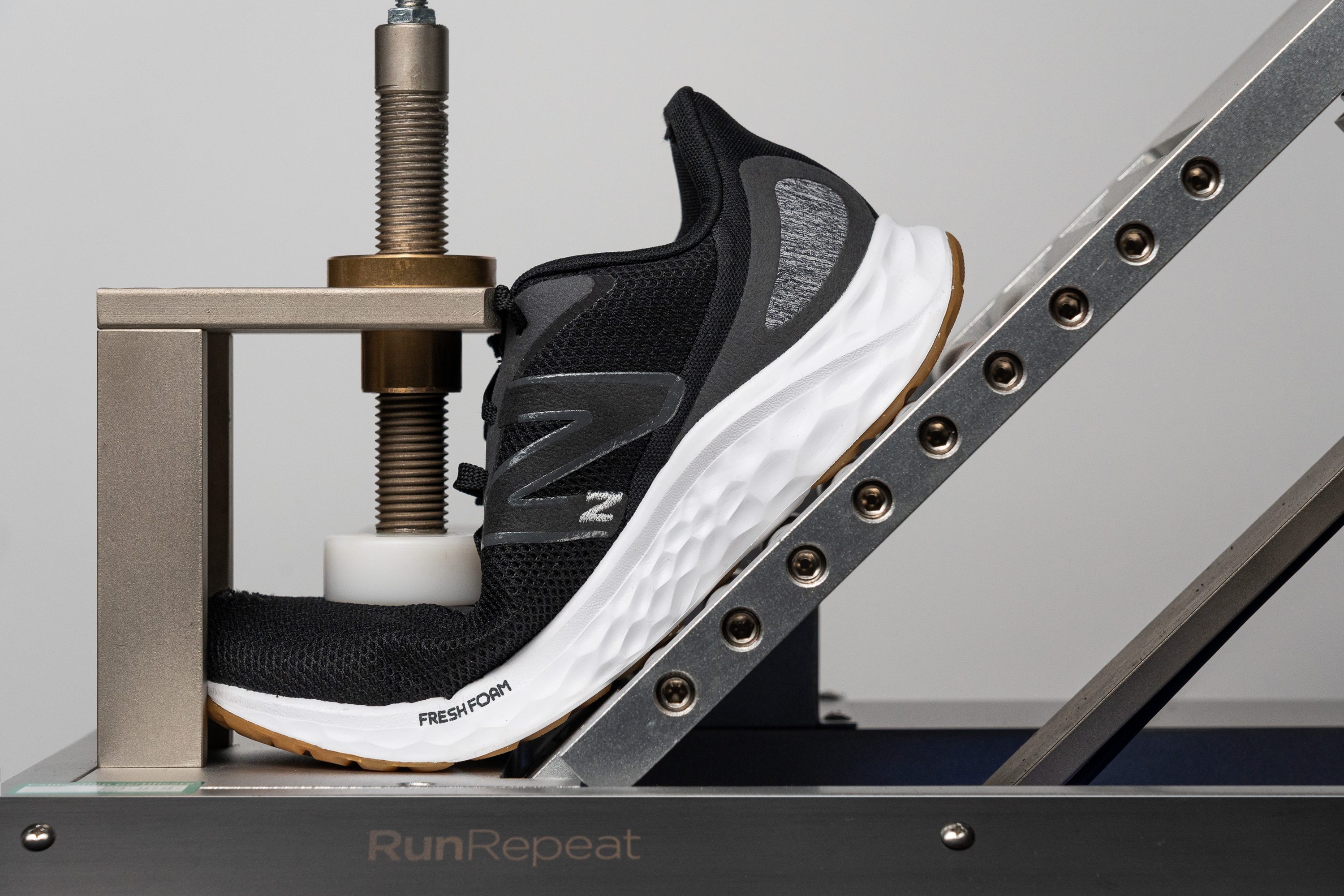
| Fresh Foam Arishi v4 | 7.0N |
| Average | 15.3N |
Weight
Weighing in at only 8.55 oz (242g), the Arishi v4 is significantly lighter than the average road shoe. This lightweight nature combined with the shoe’s delightfully springy midsole makes the shoe feel great on our feet, even after moving around in them all day long.
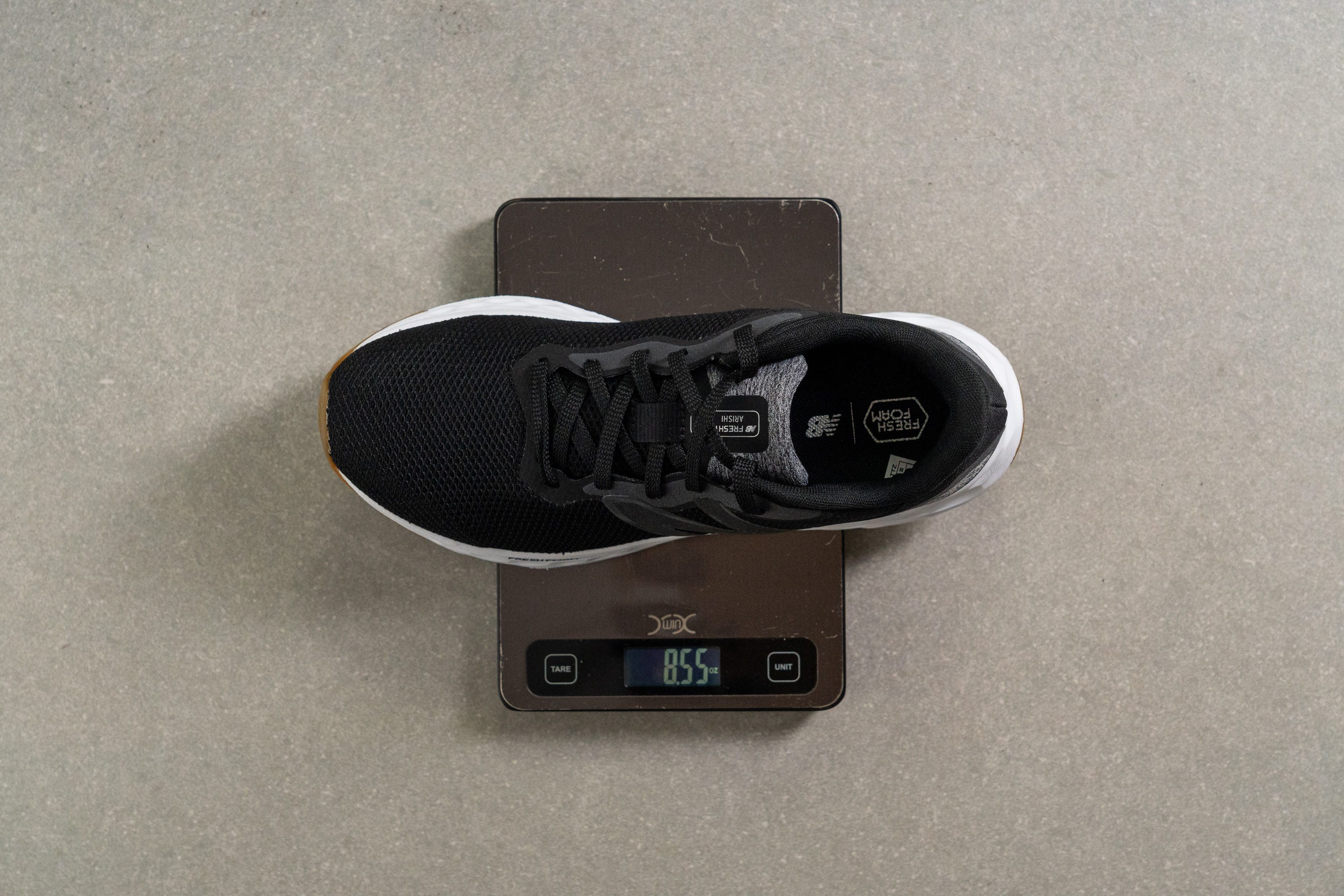
| Fresh Foam Arishi v4 | 8.5 oz (242g) |
| Average | 9.3 oz (264g) |
Breathability
In order to assess the breathability of the shoe, we pumped the Arishi v4 full of smoke to see how easily it vents from the shoe. As the footage demonstrates, smoke escapes almost immediately through the shoe’s well-perforated tongue and upper. The only section not steadily churning out smoke is the front part of the toebox, making perfection just out of reach for the Arishi v4 but still earning it a still-respectable 4 out of 5 for breathability. As such, the Arishi v4 is a nice and airy training partner for those toasty summer runs.
Examining a backlit cross-section of the upper reveals that it has plenty of pores for heat to escape through except for certain reinforced sections; namely in the front end of the toebox.
Under our microscope, we can see that this section of the upper still boasts some perforations for airflow, but the material in the layer underneath is rather dense. This explains the less-than-stellar ventilation in this part of the toebox.
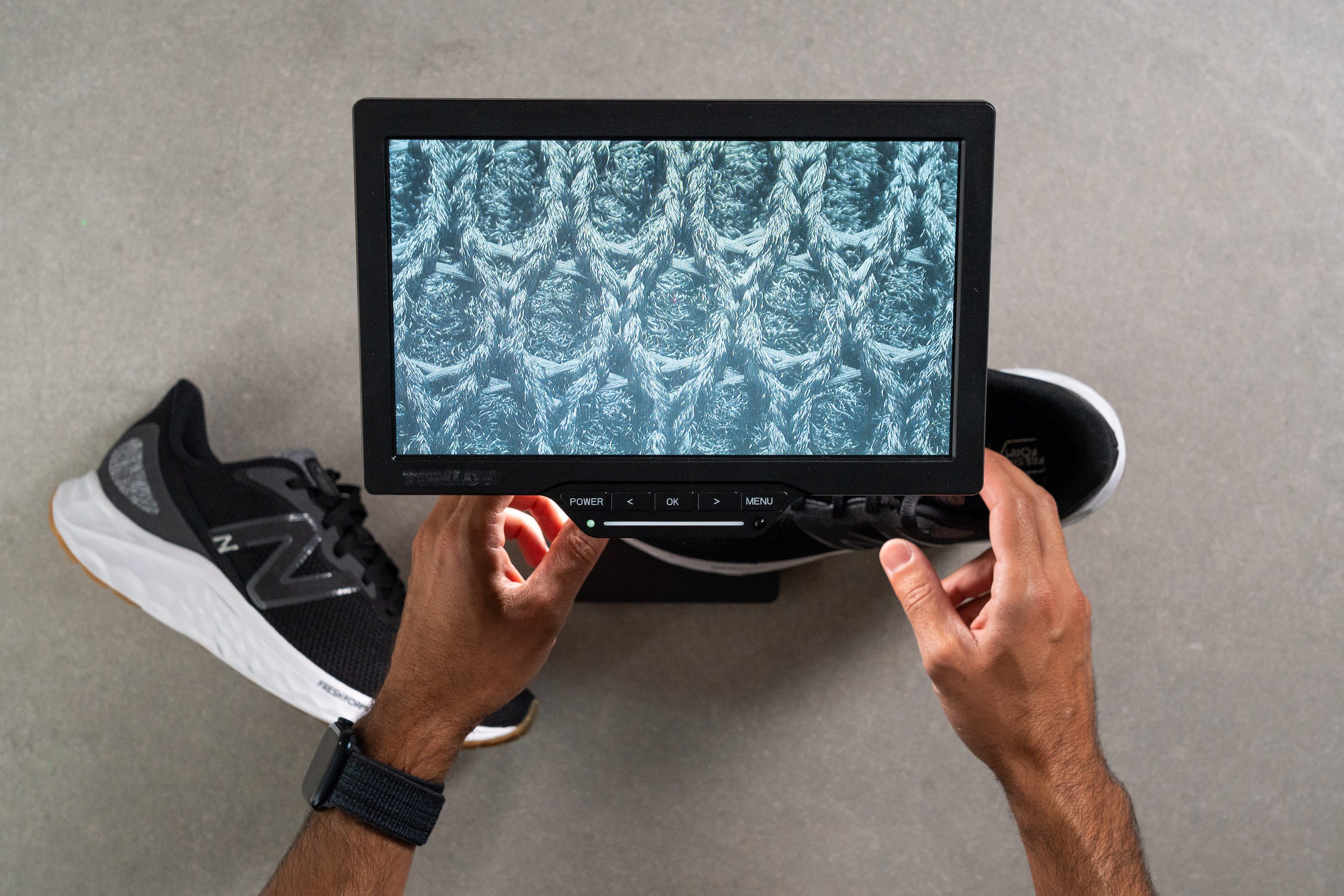
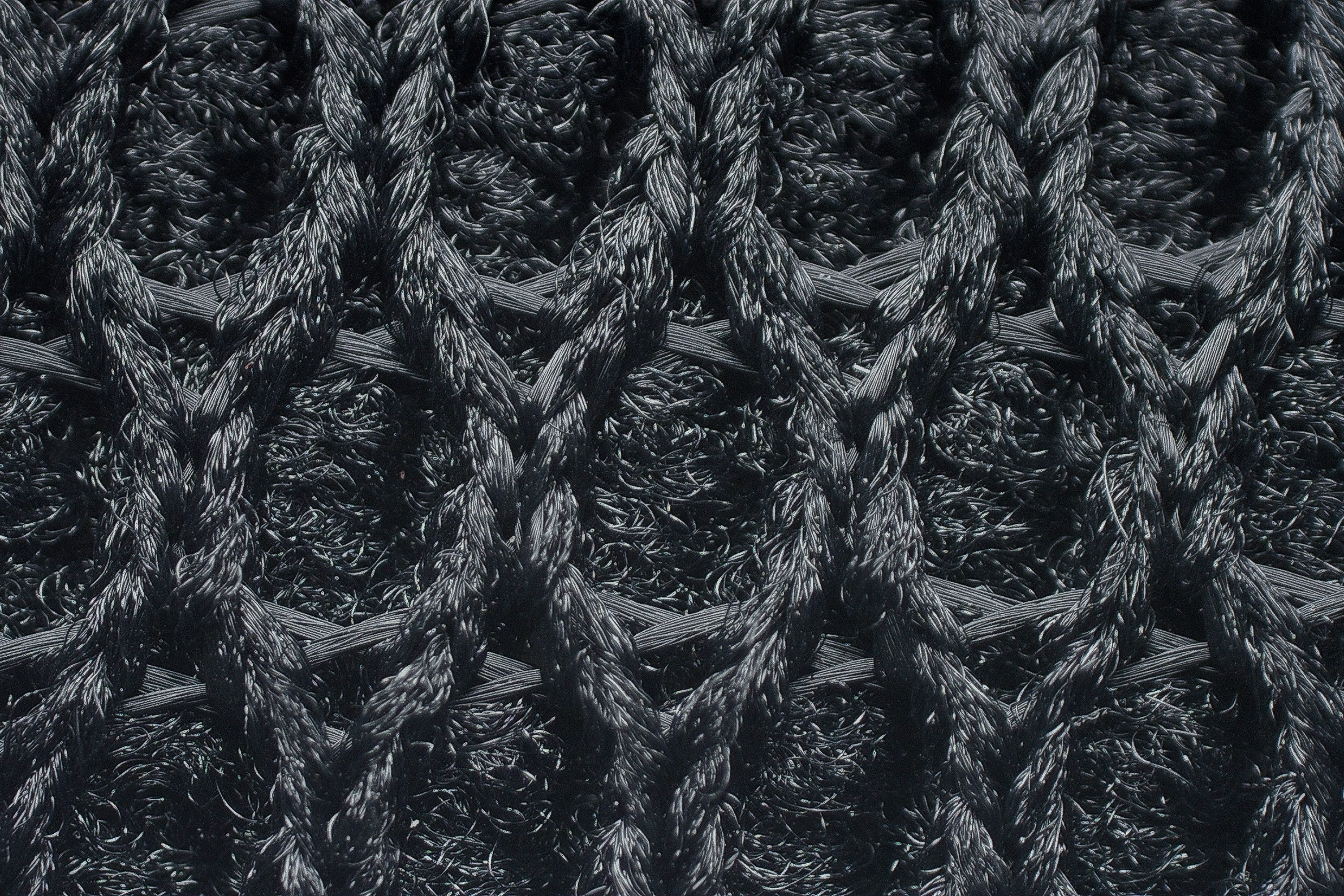
| Fresh Foam Arishi v4 | 4 |
| Average | 3.7 |
Stability
Lateral stability test
Unsurprisingly for a shoe with such a plush midsole, the Arishi v4 doesn’t feel too stable underfoot; a fact that is immediately apparent when shifting our weight from side to side in the shoe. This makes the shoe a less-than-ideal choice for runners with pronounced pronation in their strides as it won’t mitigate the inward rolling of their feet as they run.
Torsional rigidity
The shoe offered up almost no resistance as we bent and twisted it in our manual assessment, leading us to give it a score of 1 out of 5 for torsional rigidity. This means that the shoe is able to conform to the shape of the foot from landing to toe-off, making it feel extremely natural and comfortable underfoot.
On the other hand, being this flexible adversely affects the shoe’s stability. This is less-than-ideal for runners with pronating strides, for whom we recommend looking into more rigid shoes like the ASICS Gel Kayano 30.
| Fresh Foam Arishi v4 | 1 |
| Average | 3.5 |
Heel counter stiffness
The heel counter has some structure to it but didn’t put up much of a fight as we squeezed and poked at it. This leads us to give the Arishi v4 a 2 out of 5 for heel counter stiffness. On the one hand, it feels comfortable as it holds our foot in place without putting too much pressure on the heel or tendons. On the other hand, it doesn’t do a good enough job at locking down the rearfoot, leading to our heels slipping and rubbing up against it
This doesn’t pose too much of an issue for easy runs or jogs, but it’s certainly a problem for tempo training and a blister magnet when it comes to long distances.
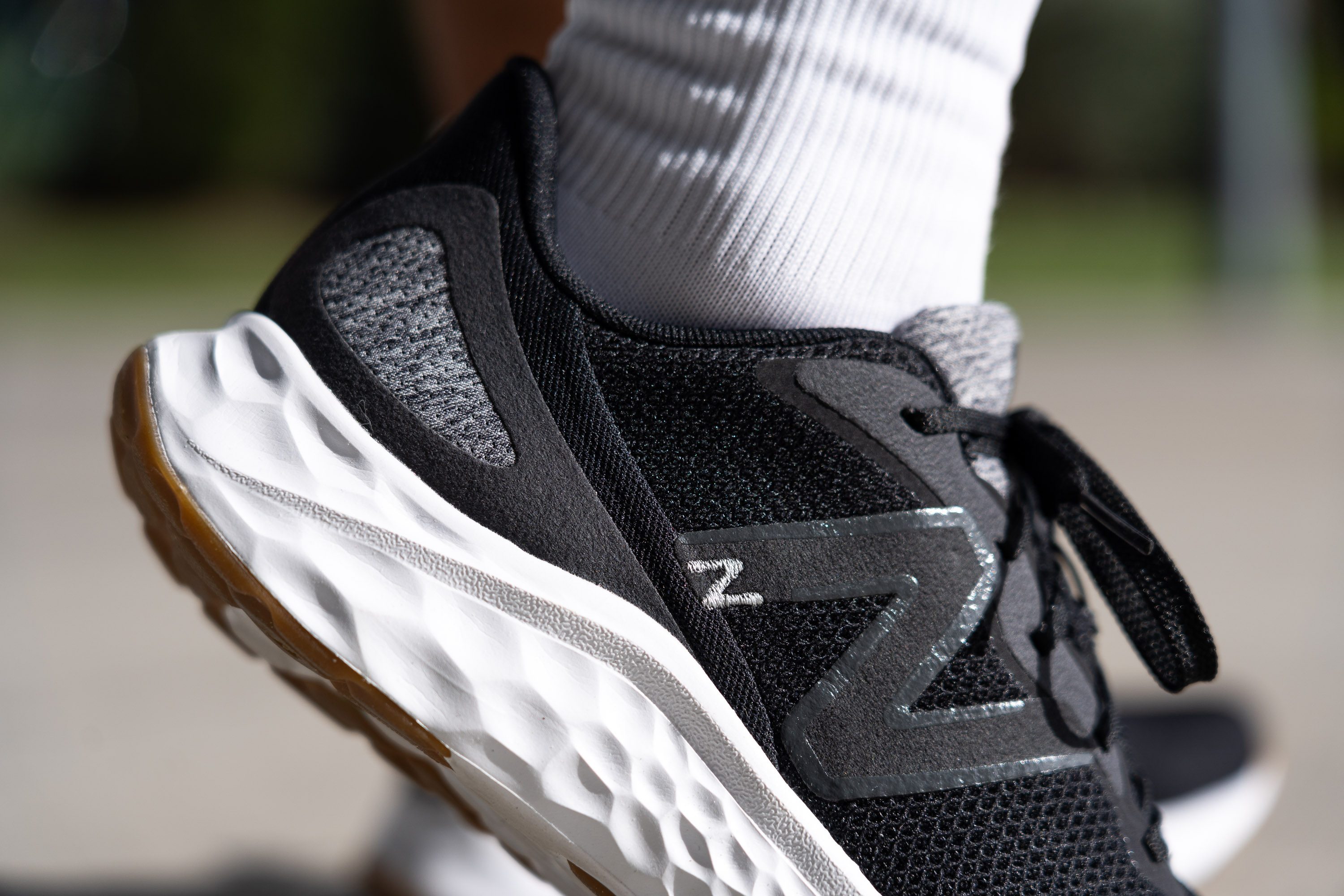
| Fresh Foam Arishi v4 | 2 |
| Average | 2.9 |
Midsole width - forefoot
At 113.7 mm wide at the forefoot according to our caliper, the Arishi v4’s midsole is right on par with the average road shoe. While this provides us with a steady enough base for relatively steady landings and toe-offs, the plush midsole does make corners feel a little wobbly, especially at higher paces.
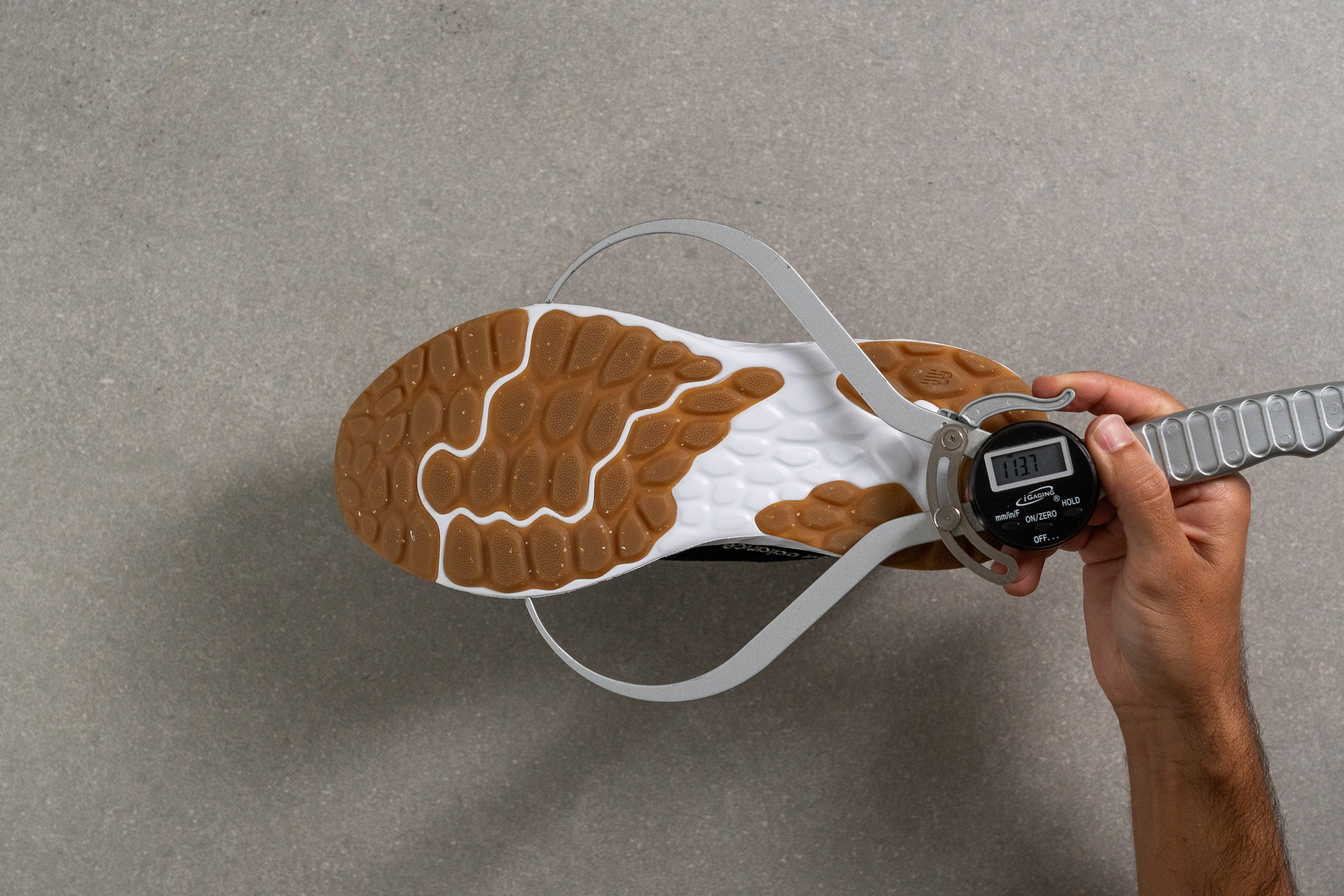
| Fresh Foam Arishi v4 | 113.7 mm |
| Average | 114.4 mm |
Midsole width - heel
Moving down to the heel we found the Arishi v4’s midsole to be slightly narrower than average at only 88.8 mm wide. This isn’t incredibly narrow, but heel strikers might want a shoe with a broader base for more stable landings like the Brooks Adrenaline GTS 23 or the neutral New Balance FF X More v4.
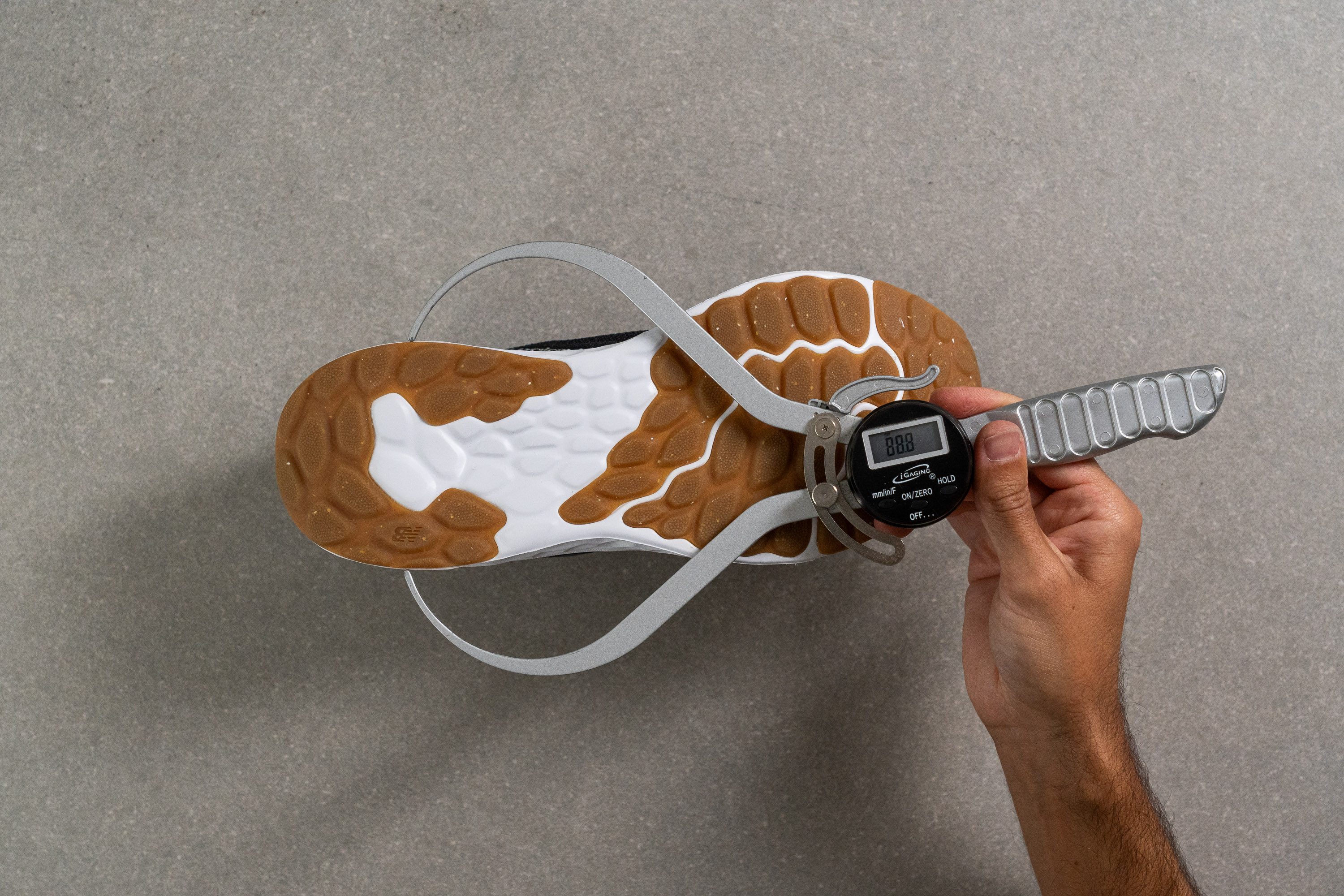
| Fresh Foam Arishi v4 | 88.8 mm |
| Average | 90.6 mm |
Durability
Toebox durability
Time to find out whether that little reinforced section does anything to increase the durability of the toebox. We fired up our Dremel and pressed its grinding element to the toebox with 3.2N of force spinning at 5K RPM. We were optimistic at first, but seeing the wisps of material being cast aside towards the end of the test didn’t bode well.
As we can see from the aftermath of the four-second test, our tool blasted all the way through the upper material, leaving a gaping and unsightly hole at the point of contact. As such we give the Arishi v4 a toebox durability score of 1 out of 5.
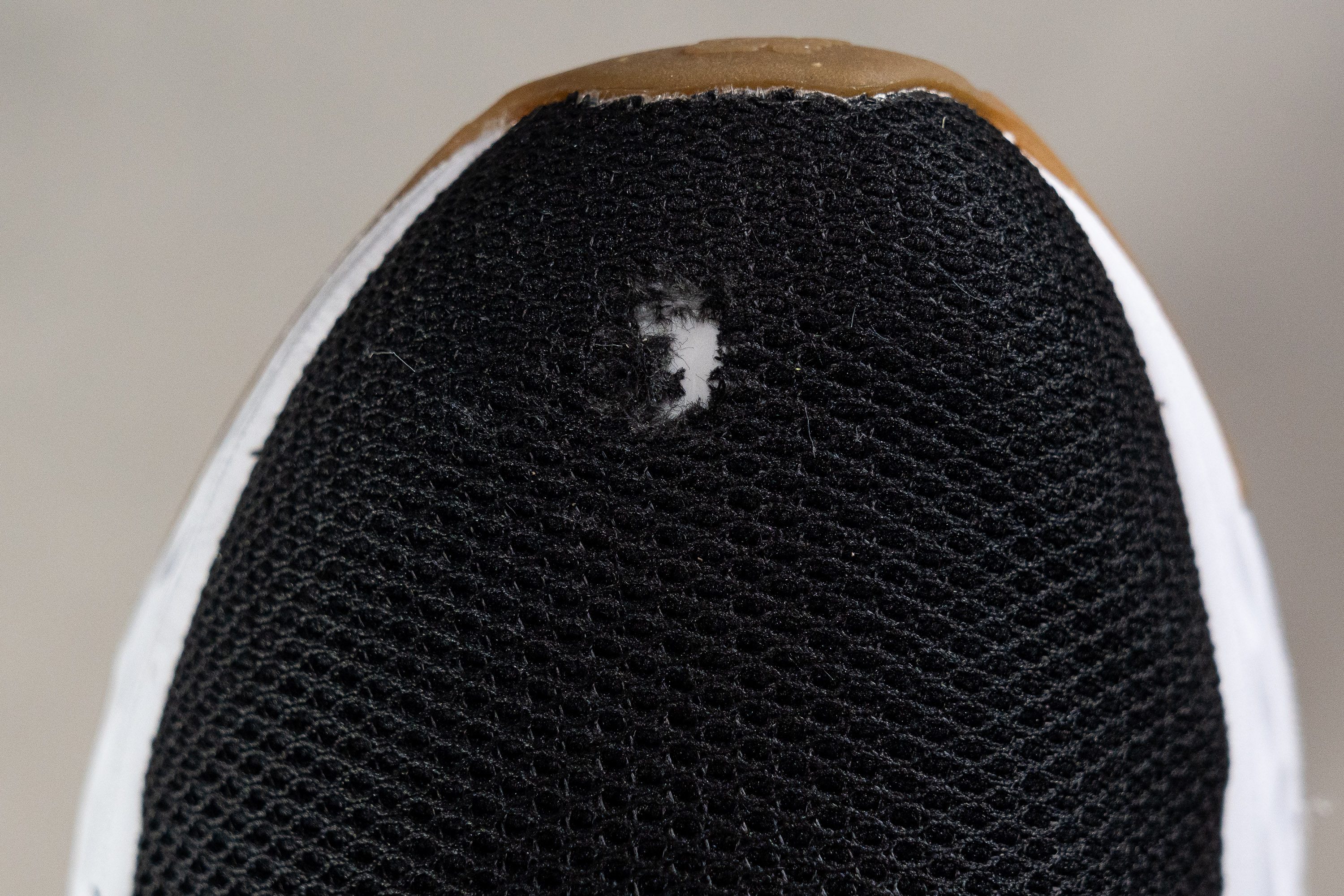
| Fresh Foam Arishi v4 | 1 |
| Average | 2.6 |
Heel padding durability
The shoe’s heel padding didn’t fare much better against our Dremel. The grinding element immediately minced its way through the heel collar lining and feasted upon the soft padding within. This lackluster performance also earns a score of 1 out of 5.
While this shouldn’t present any issues over the normal lifetime of the shoe, we don’t recommend going for sockless runs as the repeated friction of heel rubs is likely to prematurely wear down the heel padding and compromise the shoe’s rearfoot lockdown.
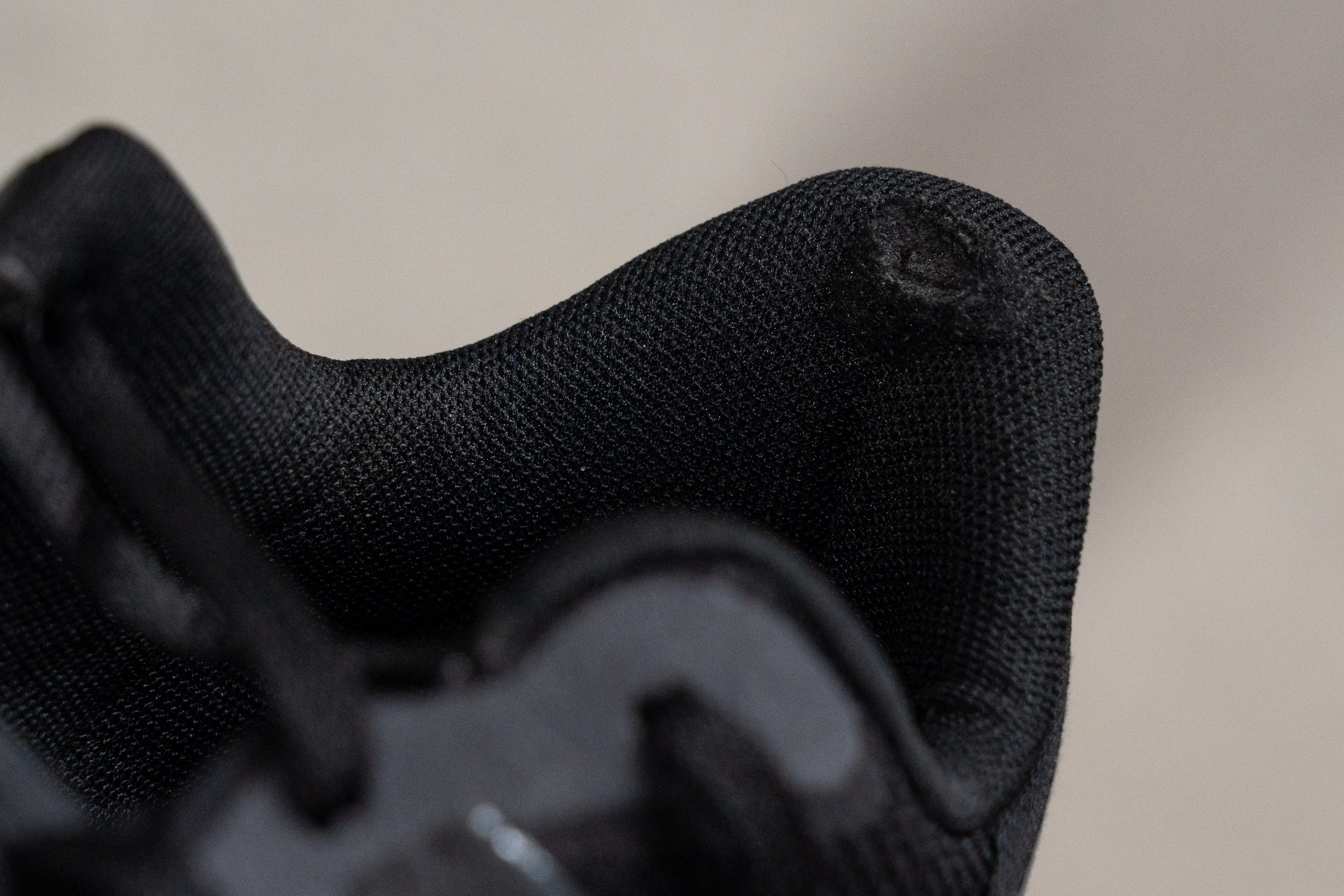
| Fresh Foam Arishi v4 | 1 |
| Average | 3.4 |
Outsole durability
Testing the durability of the outsole marks the final appearance of our relentless Dremel. This time wielding it at 10K RPM, we set it upon the outsole with 3.2N of force for a gruelling twenty-seconds.
While the test seems rather dramatic, assessing the damage left in its wake with our tire gauge reveals that only 0.8 mm of material was lost from the outsole. This puts the Arishi v4 on par with the average road shoe and means that the shoe should comfortably last 400 miles of use without any significant signs of wear.
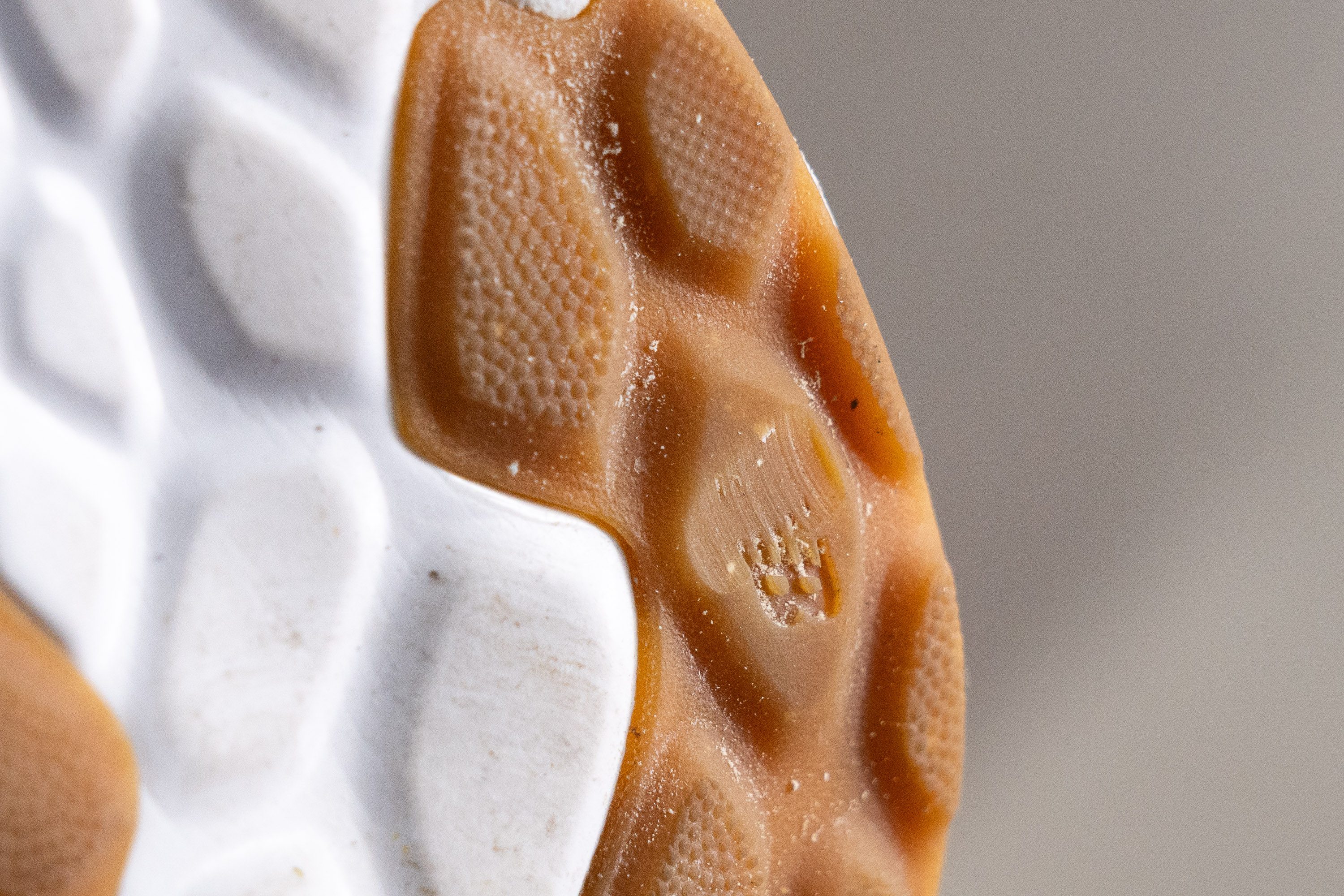
| Fresh Foam Arishi v4 | 0.8 mm |
| Average | 1.1 mm |
Outsole thickness
Using our caliper, we measured the outsole to be 3.6 mm thick, which is also within the average range for road shoes. As such, with less than a quarter of the outsole material lost in our durability test, there should be more than enough material left over even after facing extreme wear and tear.
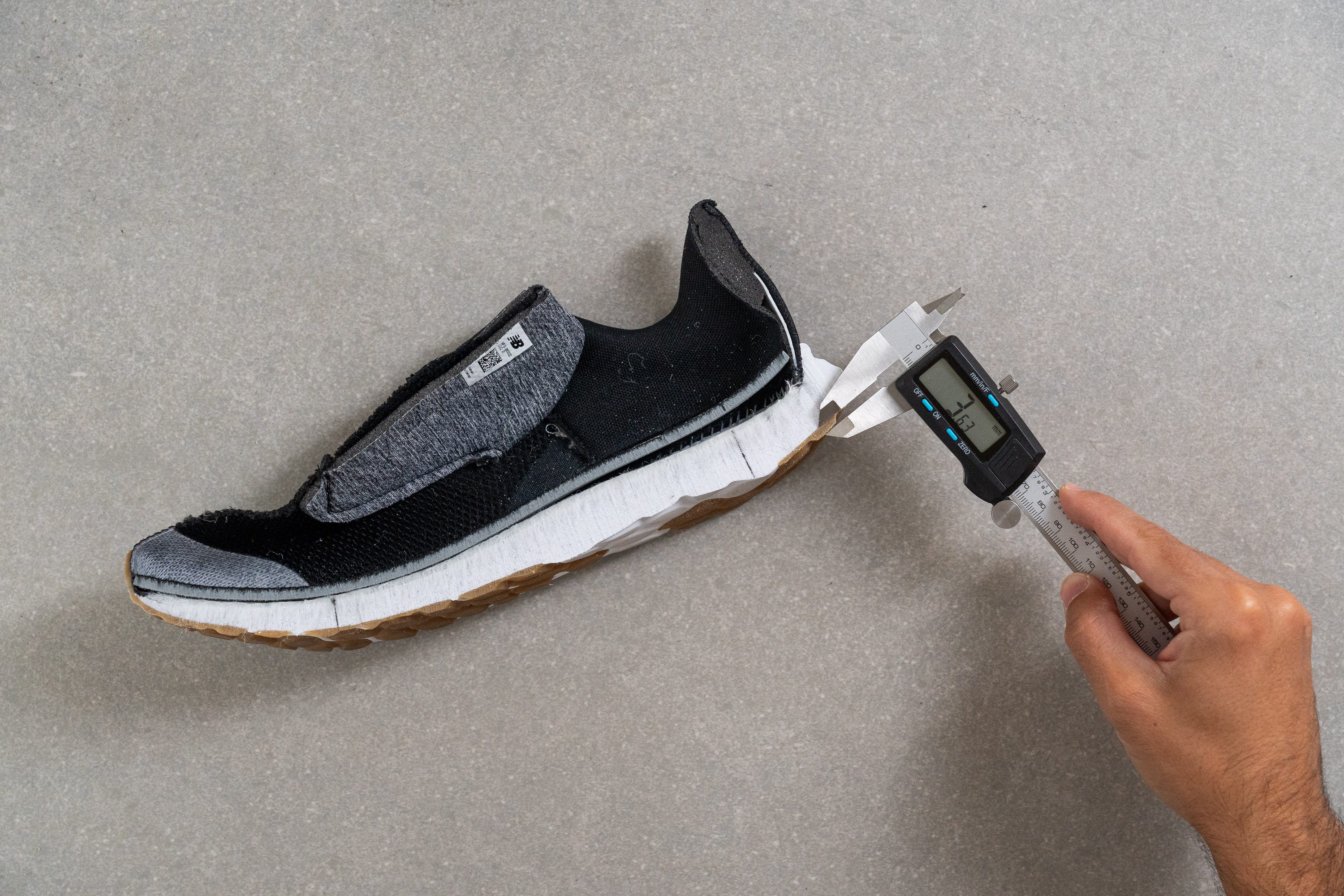
| Fresh Foam Arishi v4 | 3.6 mm |
| Average | 3.2 mm |
Misc
Insole thickness
The Arishi v4’s insole is 3.9 mm thick according to our caliper, making it just shy of our current lab average. This isn’t noticeable, however, as we still enjoyed a nice and soft landing surface within the shoe that complements the midsole cushion.
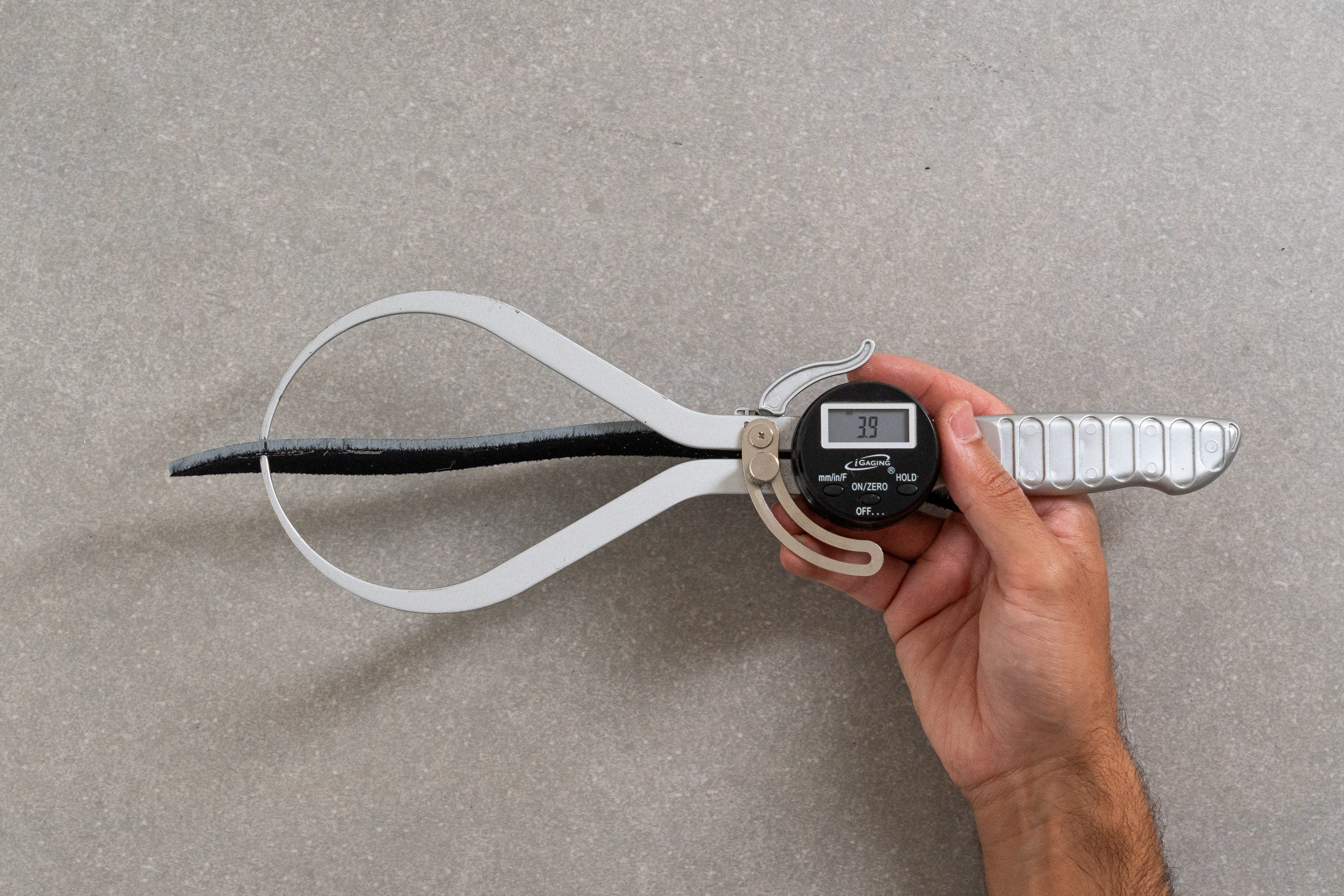
| Fresh Foam Arishi v4 | 3.9 mm |
| Average | 4.5 mm |
Removable insole
The Arishi v4’s insole is fully removable, making it compatible with custom orthotics which, considering the shoe’s limited arch support, will come in handy for some runners.
| Fresh Foam Arishi v4 | Yes |
Midsole softness in cold (%)
To see how the Fresh Foam midsole reacts to cold weather, we placed the Arishi v4 in the freezer for twenty minutes. Once appropriately chilled, we took another durometer reading of the midsole and got a reading of 20.6 HA. This isn’t only softer than the average road shoe under similar conditions, but at room temperature too! While not as plush as under normal conditions, the Arishi v4 will still feel soft and forgiving underfoot even during the most frigid winter runs.
Becoming 42.3% firmer in the cold means that the Arishi v4 performs less consistently than average between warm and cold climates. As such the shoe will certainly feel different underfoot based on the surrounding temperature.
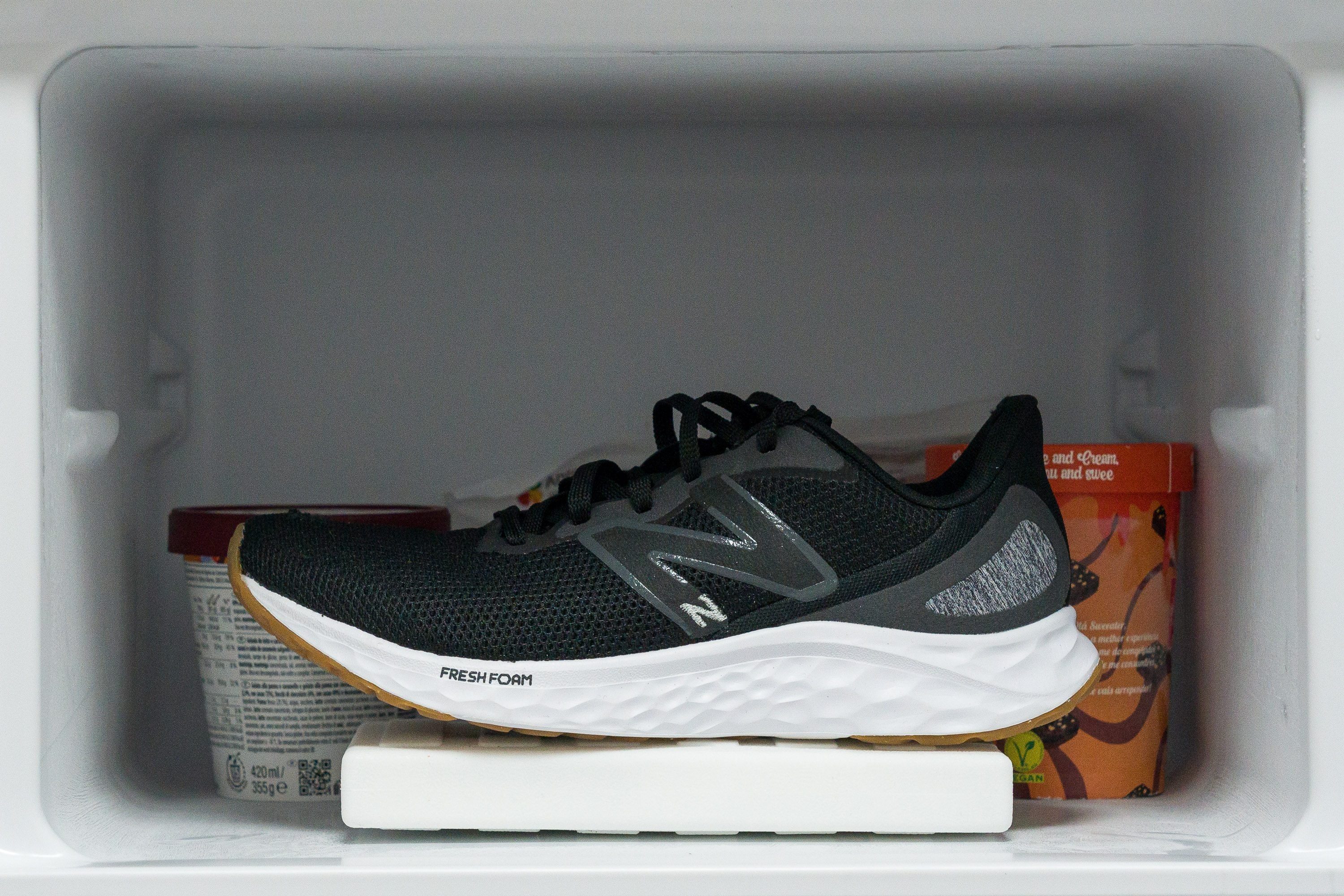
| Fresh Foam Arishi v4 | 42% |
| Average | 24% |
Reflective elements
The Arishi v4 doesn’t feature any reflective elements, so nocturnal runners will need to use additional high-visibility gear to stay safe on dimly-lit routes.
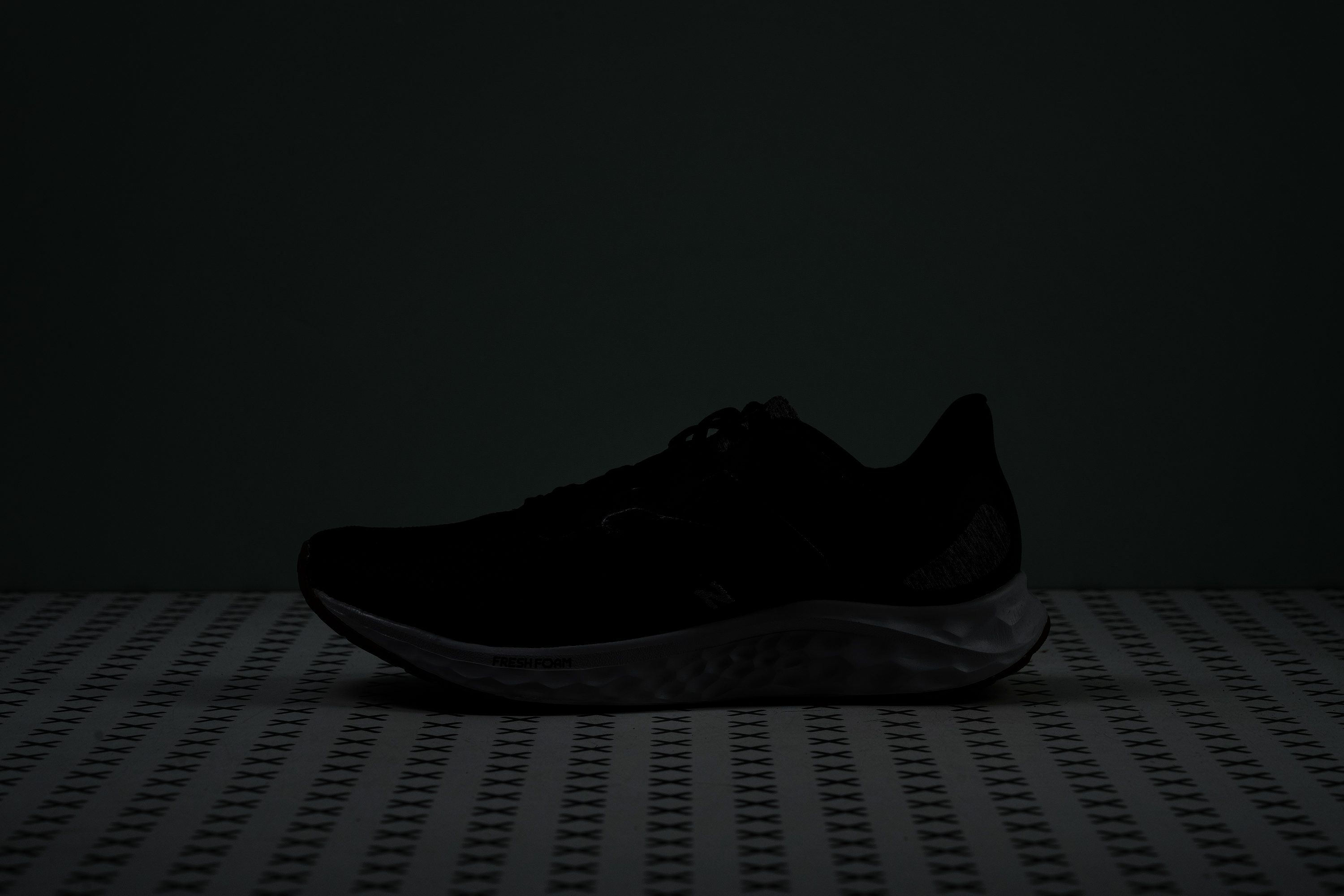
| Fresh Foam Arishi v4 | No |
Tongue padding
We measured the tongue to be 5.7 mm thick which is right within the average range for road shoes. This provides us with a secure and comfortable midfoot lockdown that also protects our instep from any trace of lace bite.
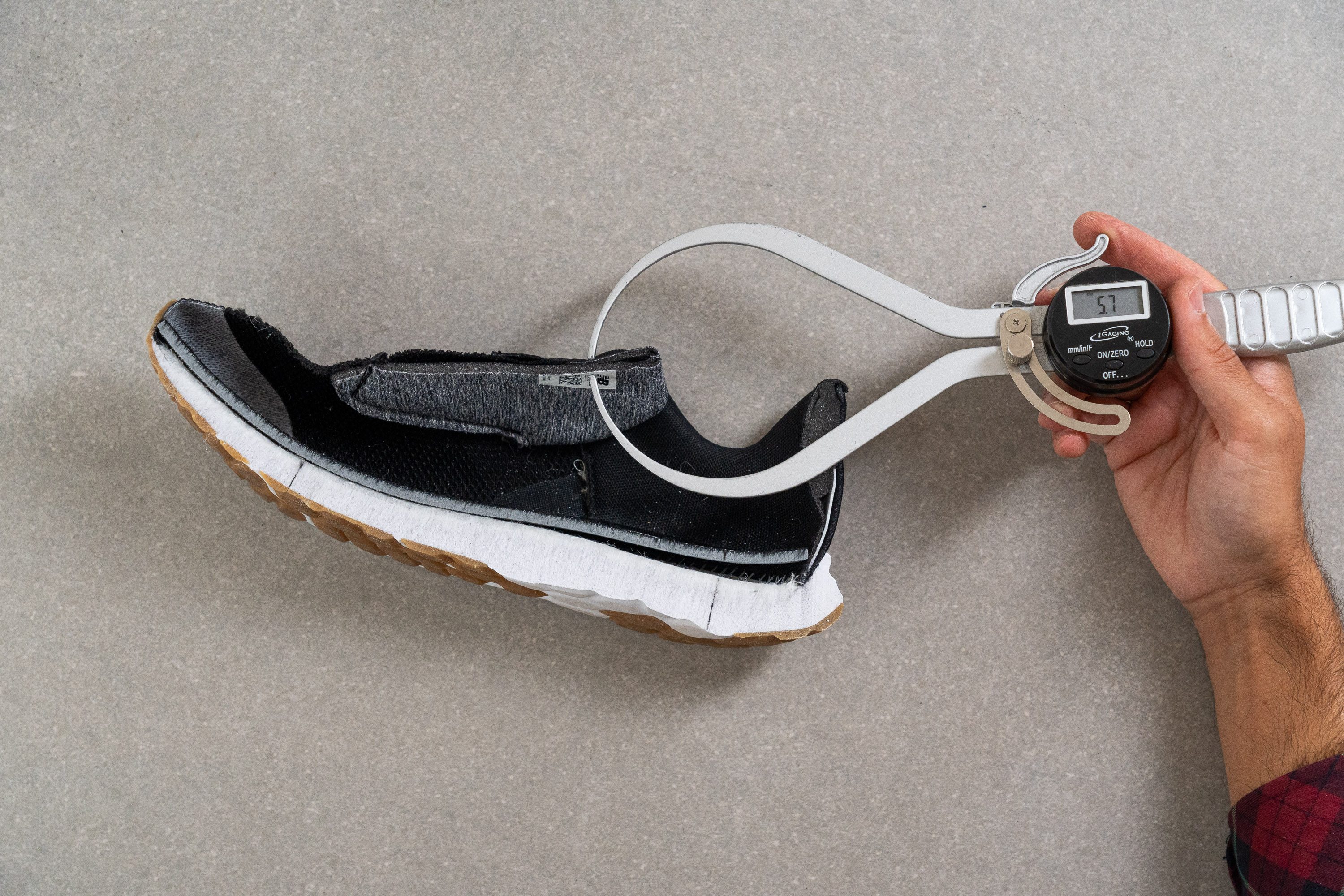
| Fresh Foam Arishi v4 | 5.7 mm |
| Average | 5.7 mm |
Tongue: gusset type
The Arishi v4’s tongue is non-gusseted but we didn’t experience any slips to speak of.
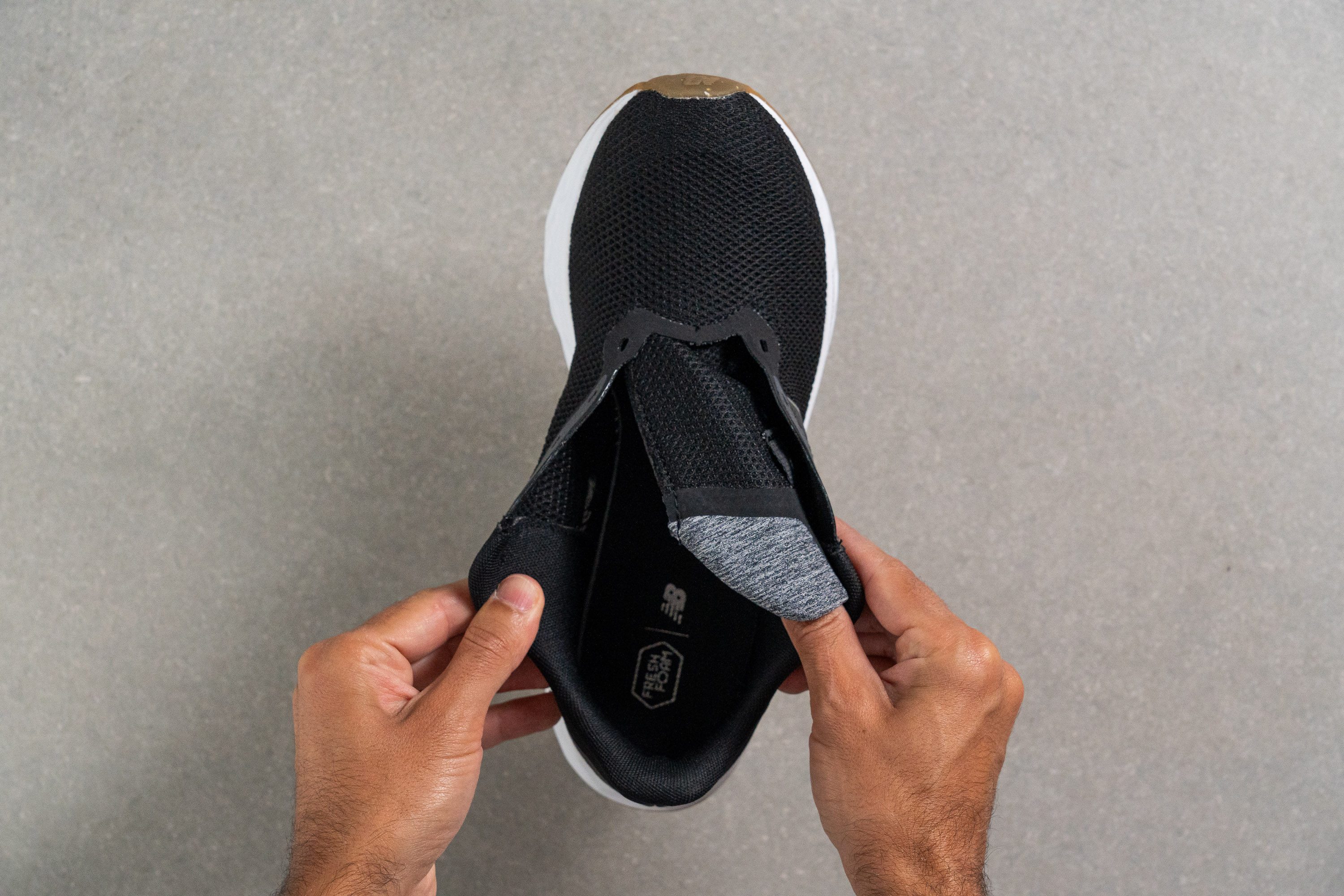
| Fresh Foam Arishi v4 | None |

